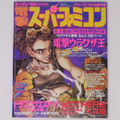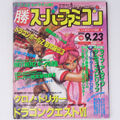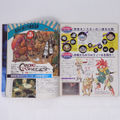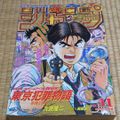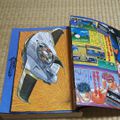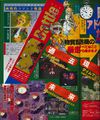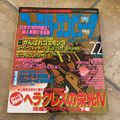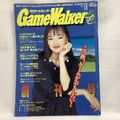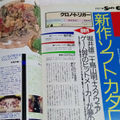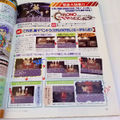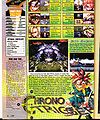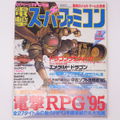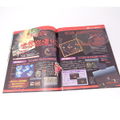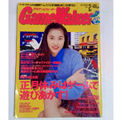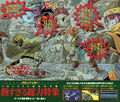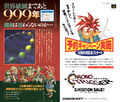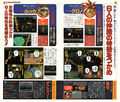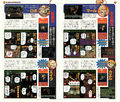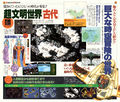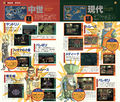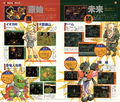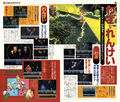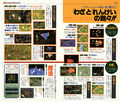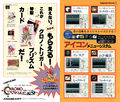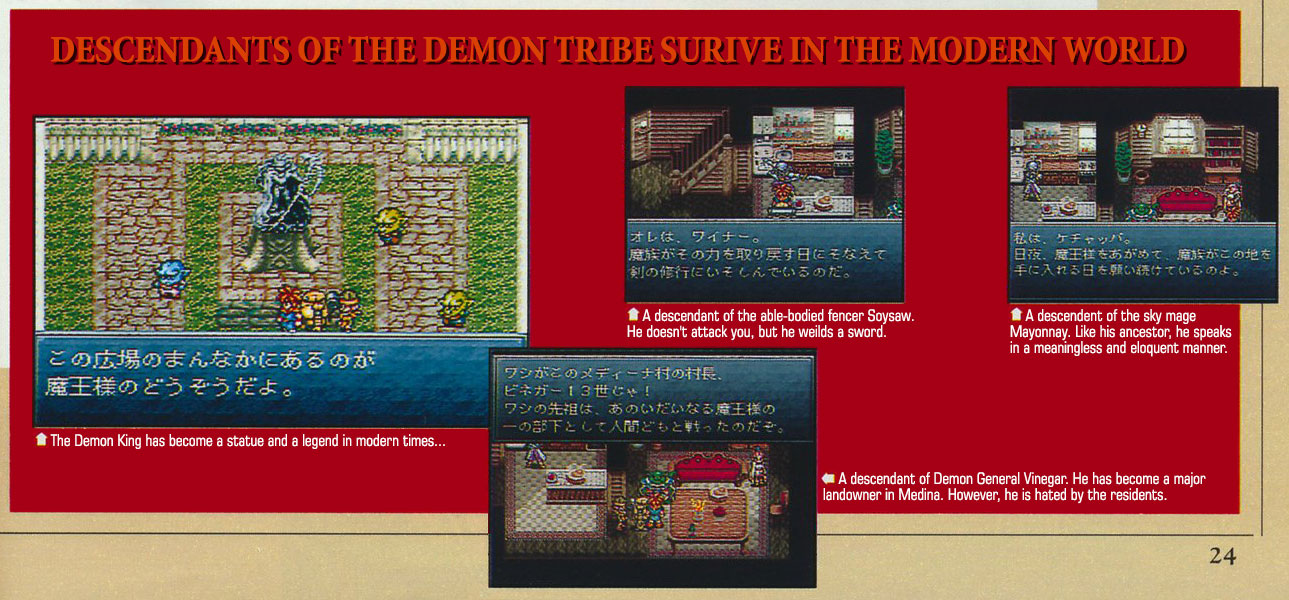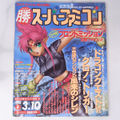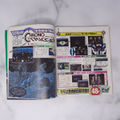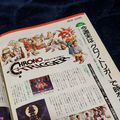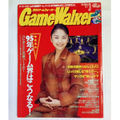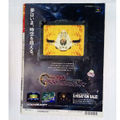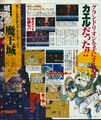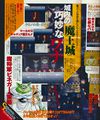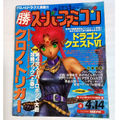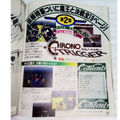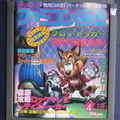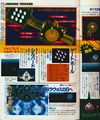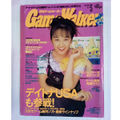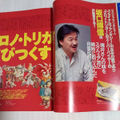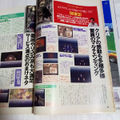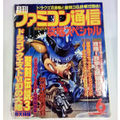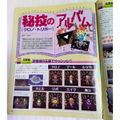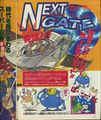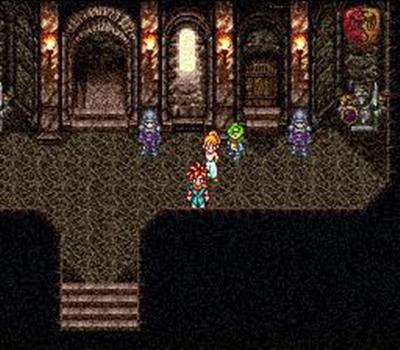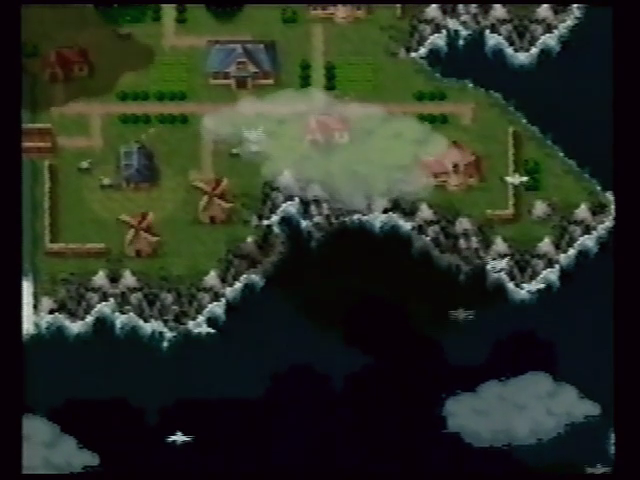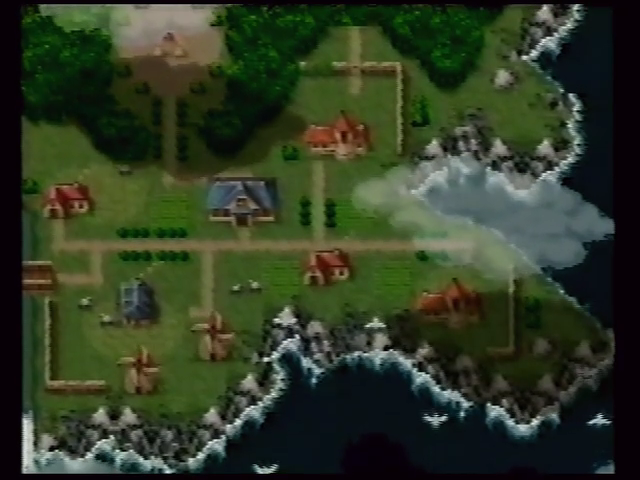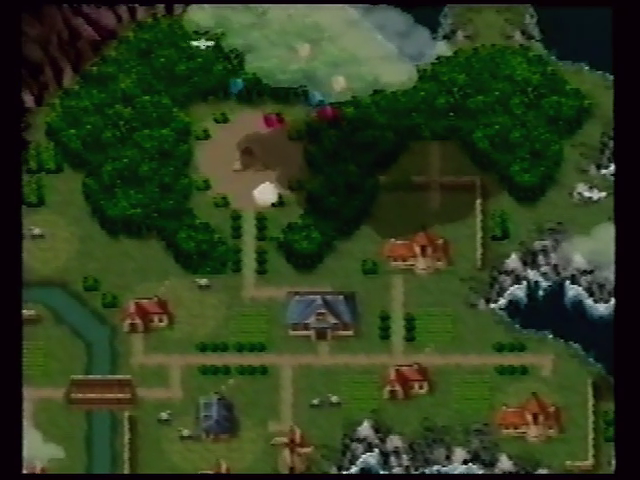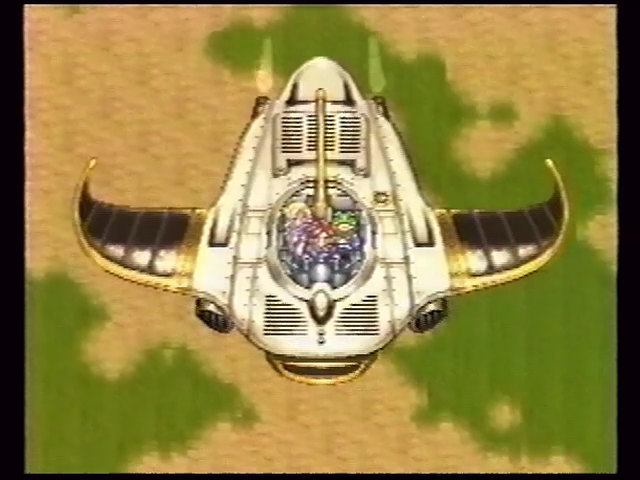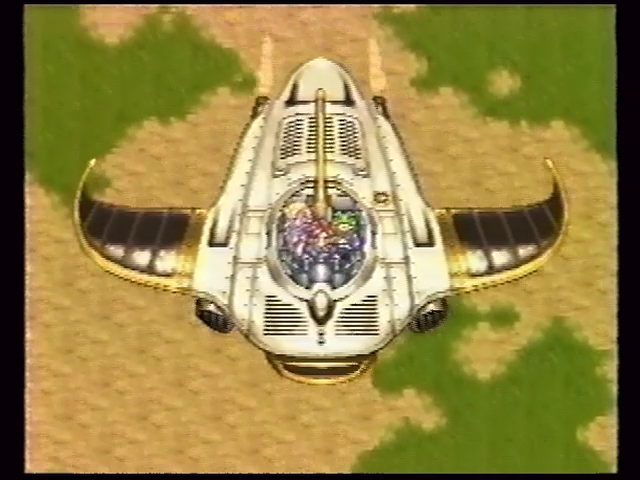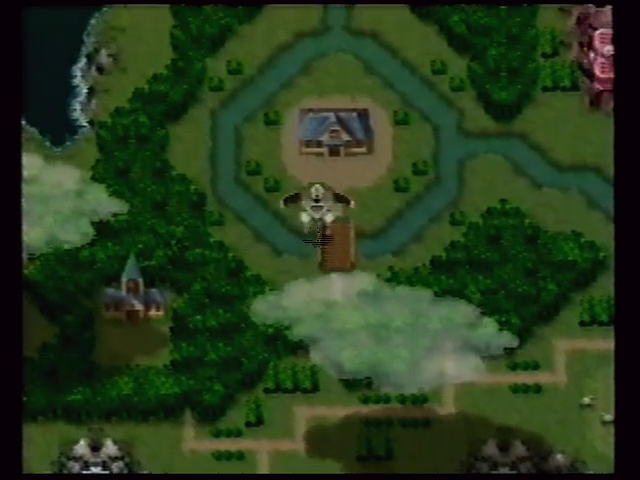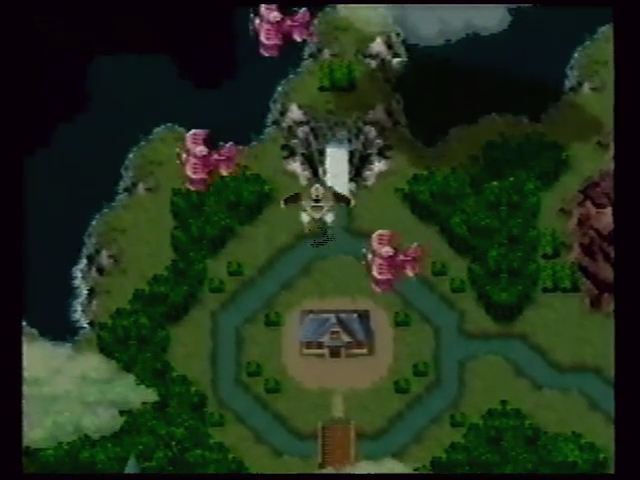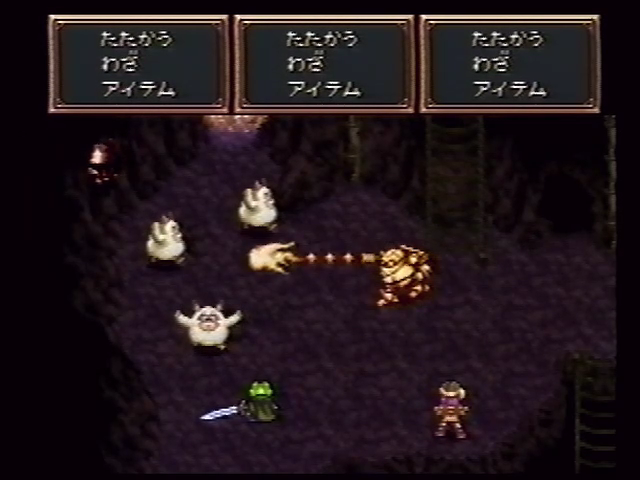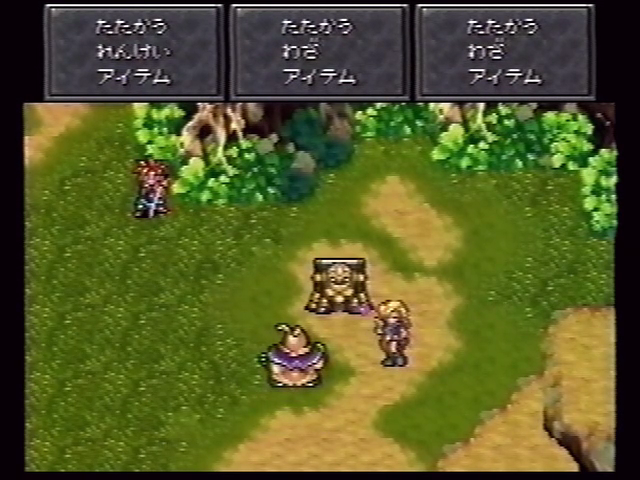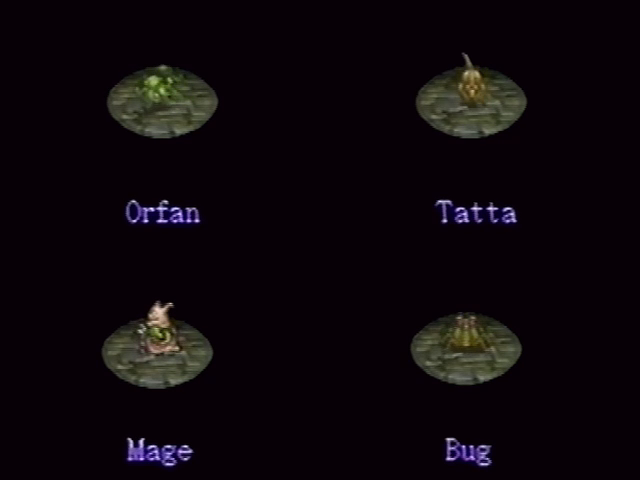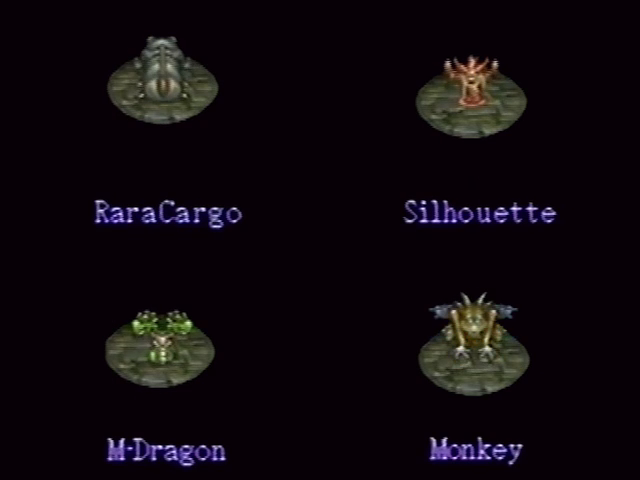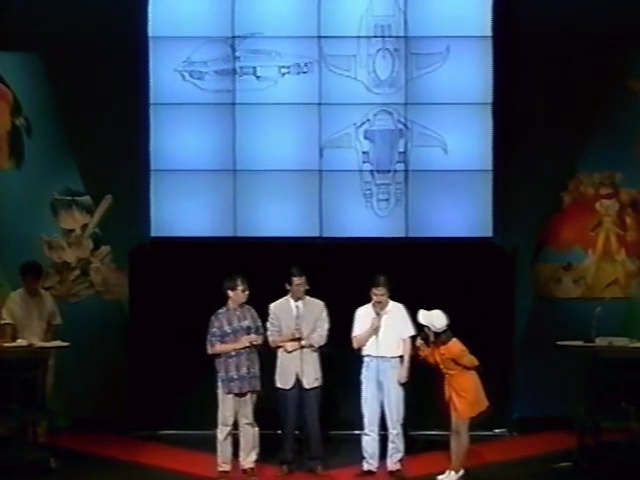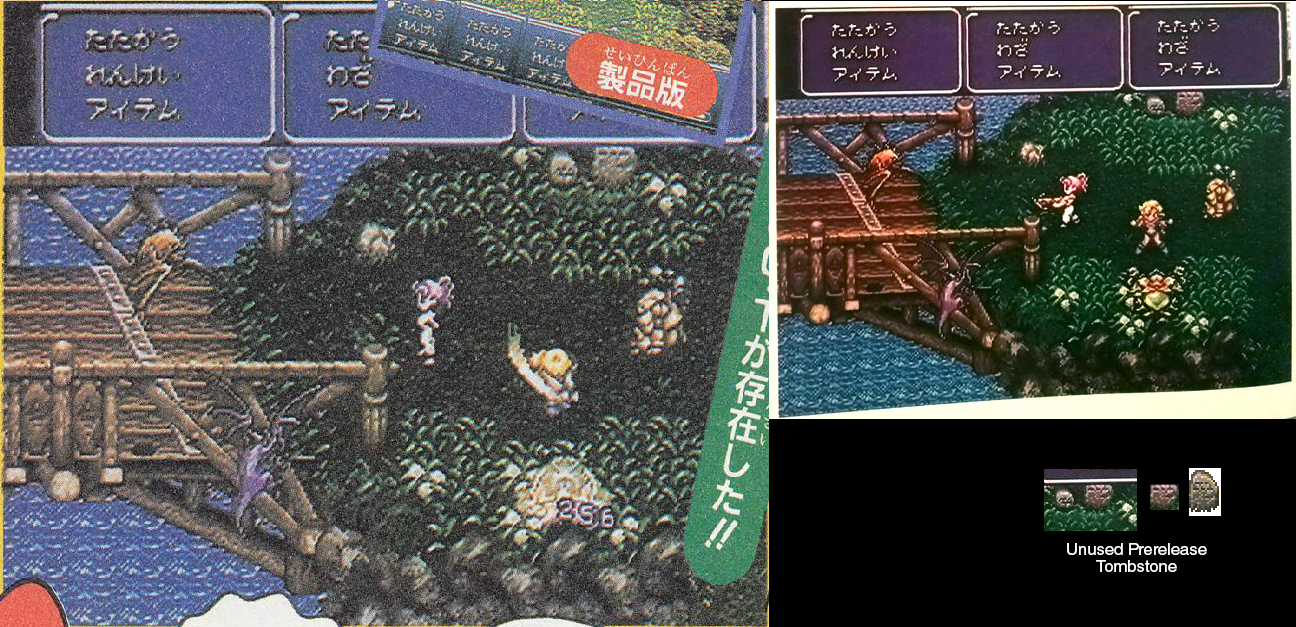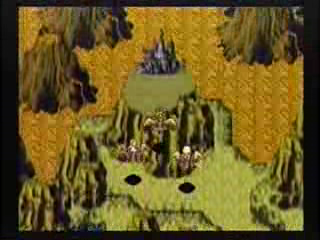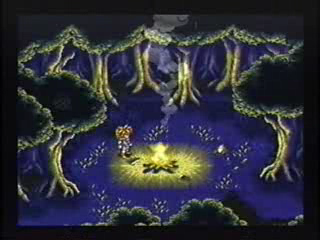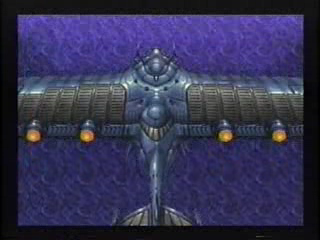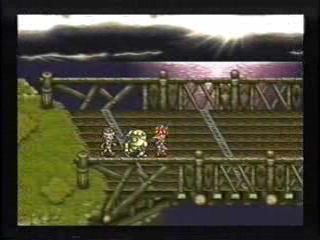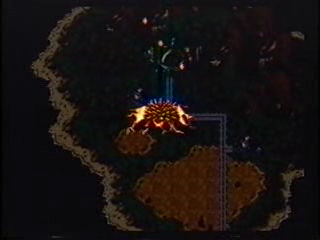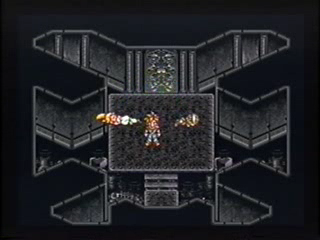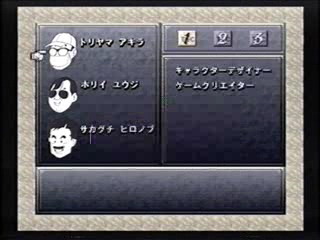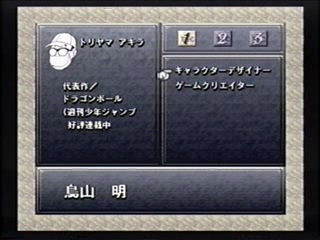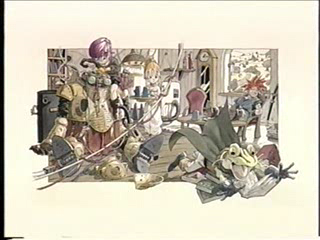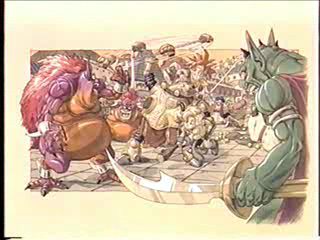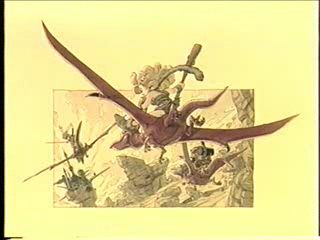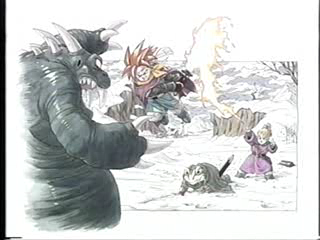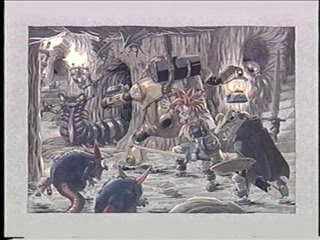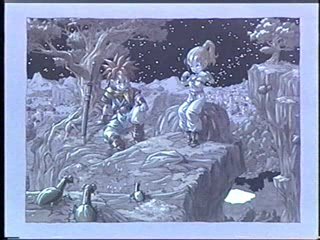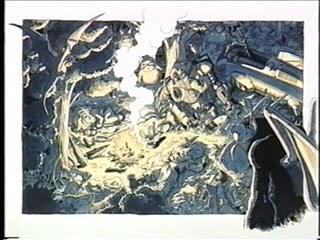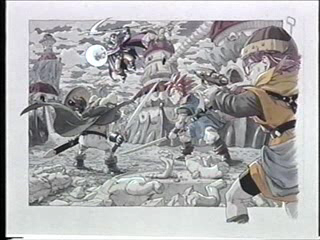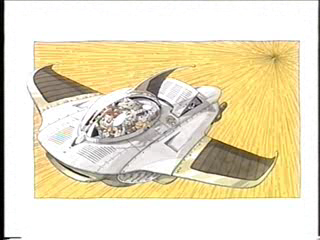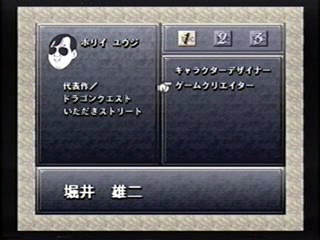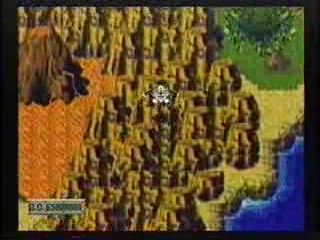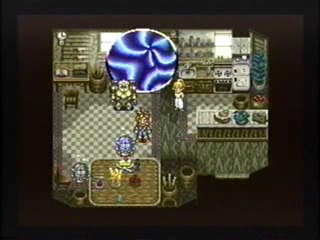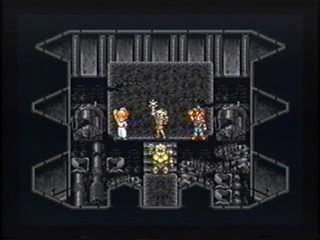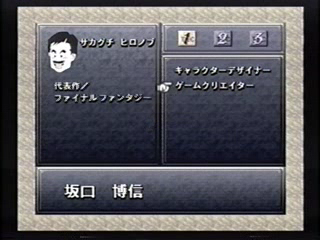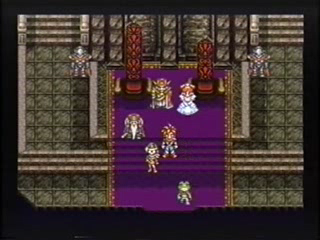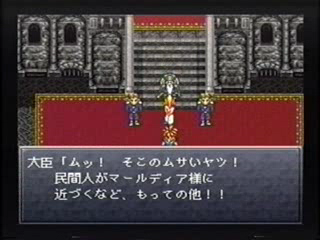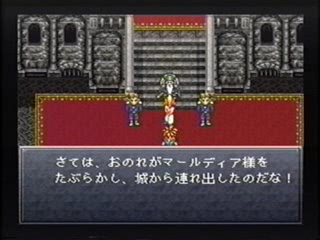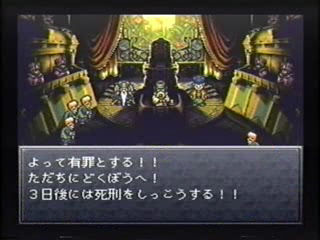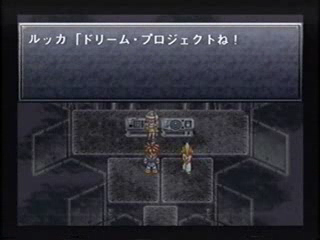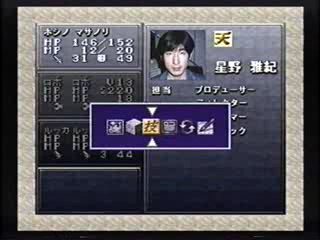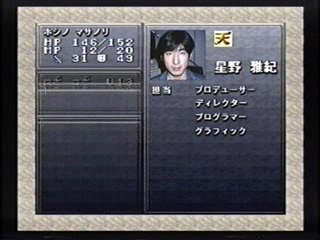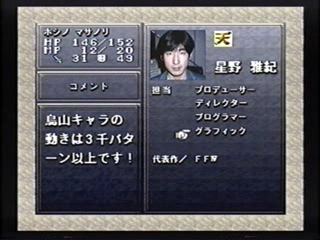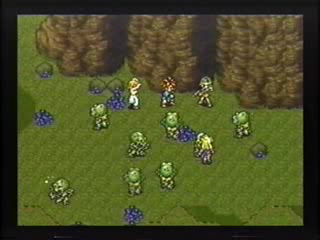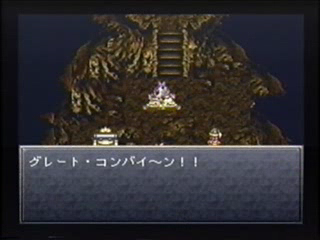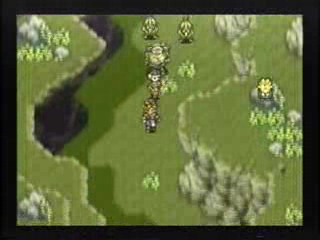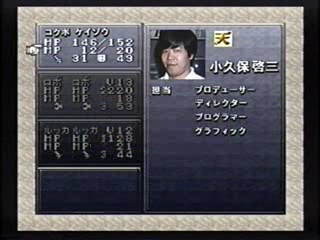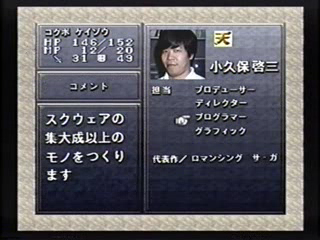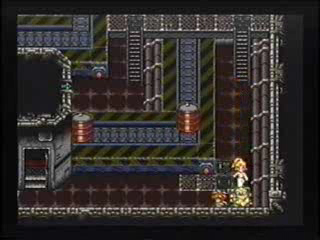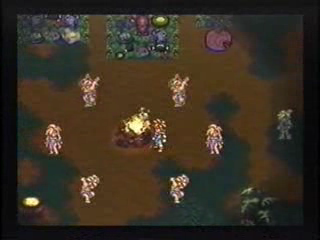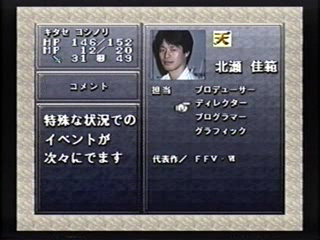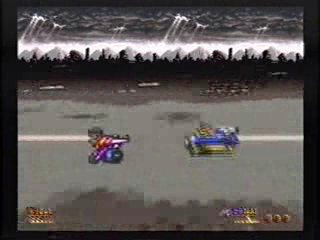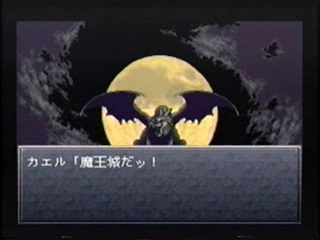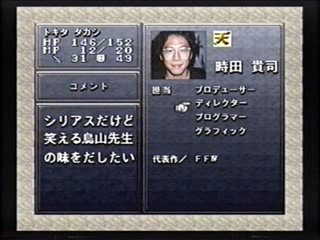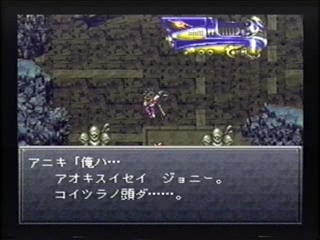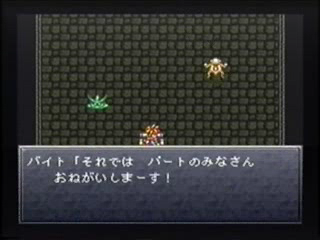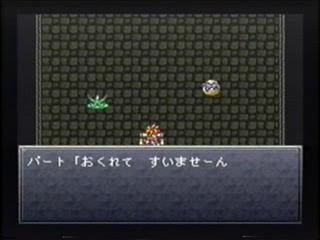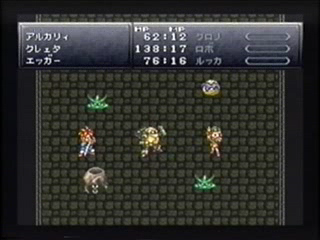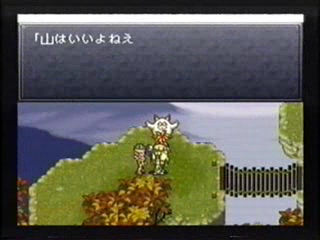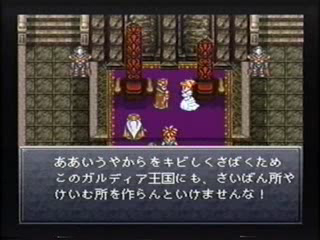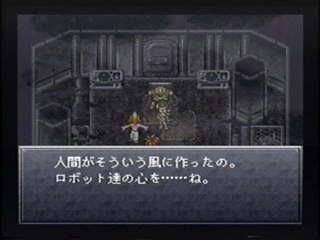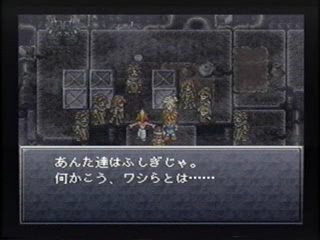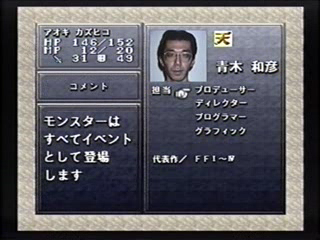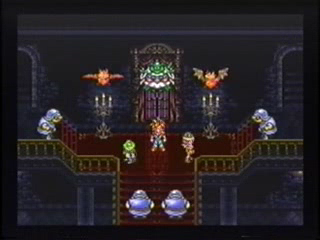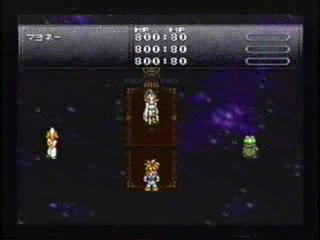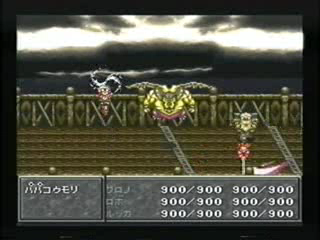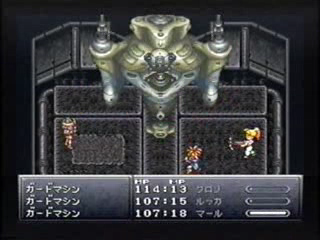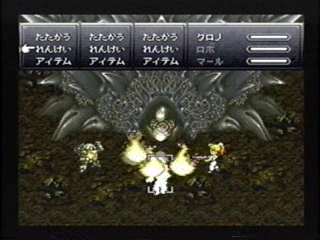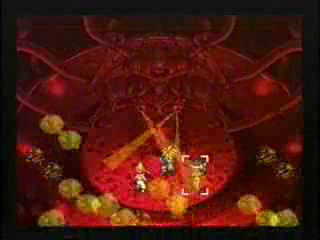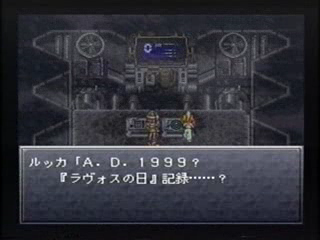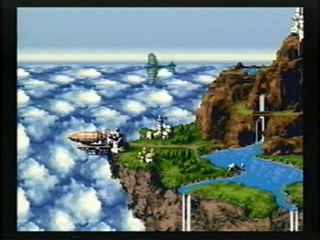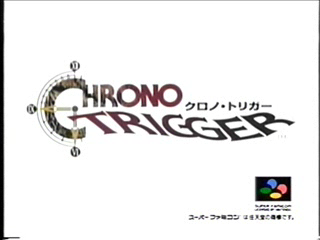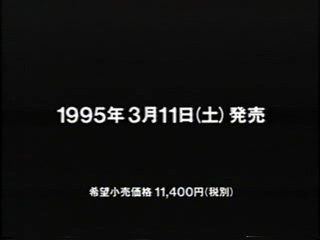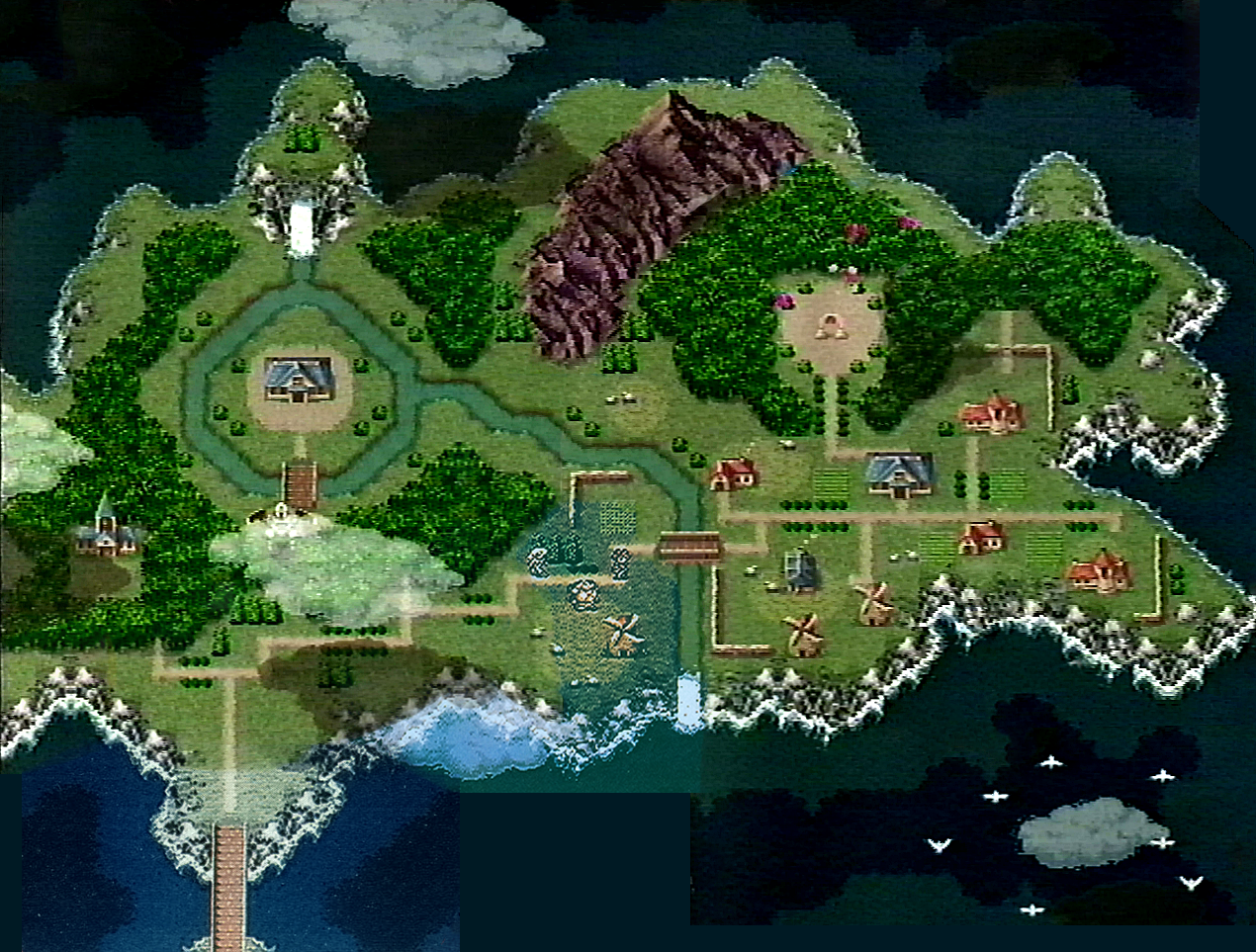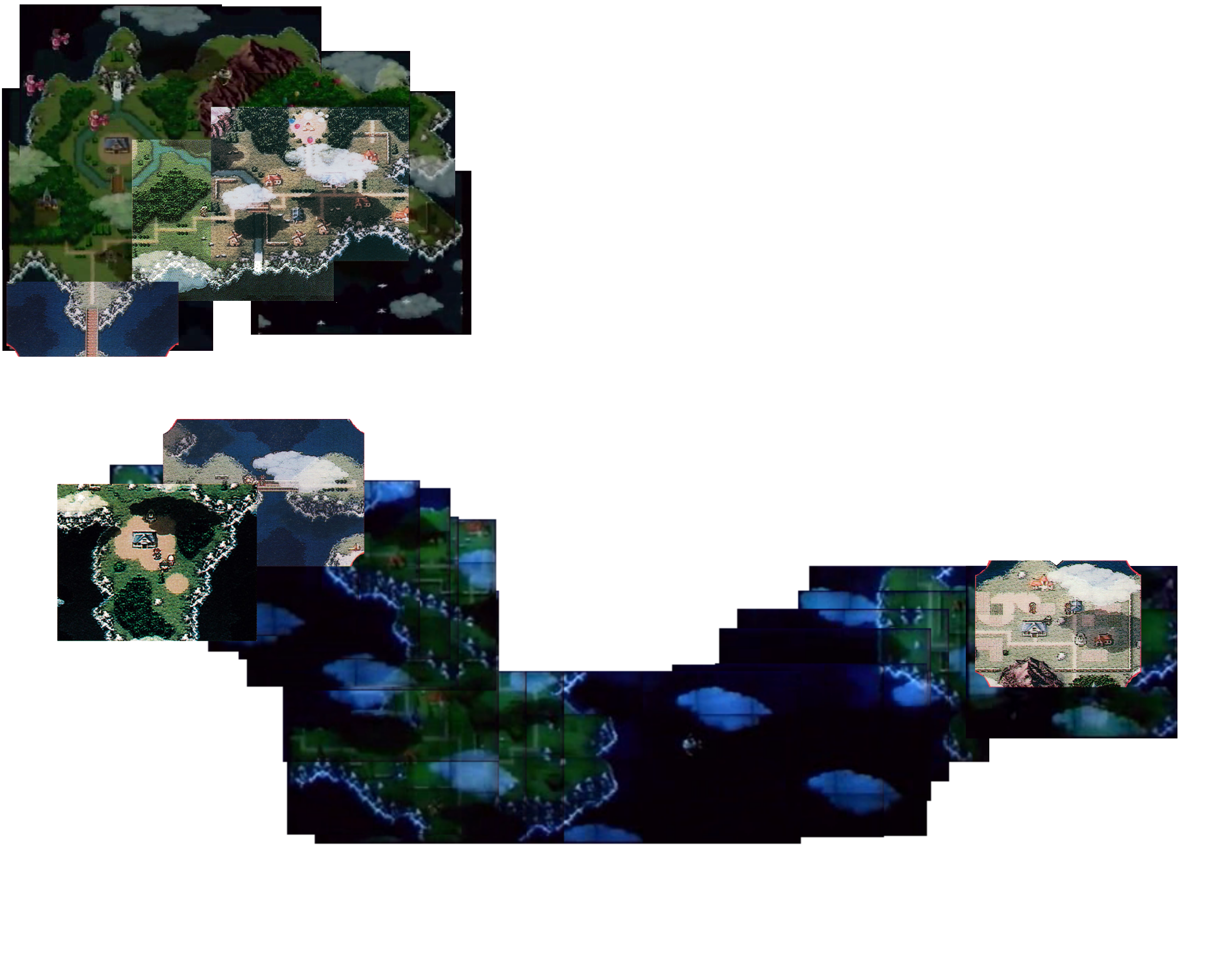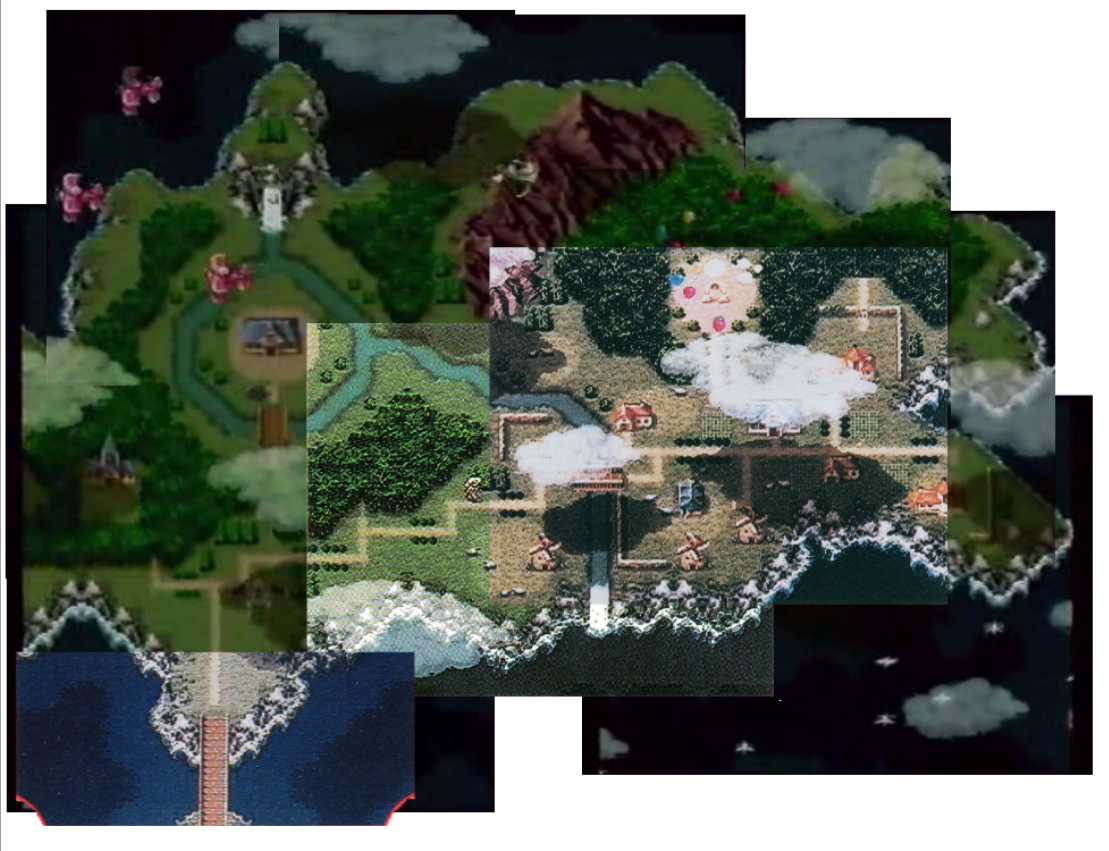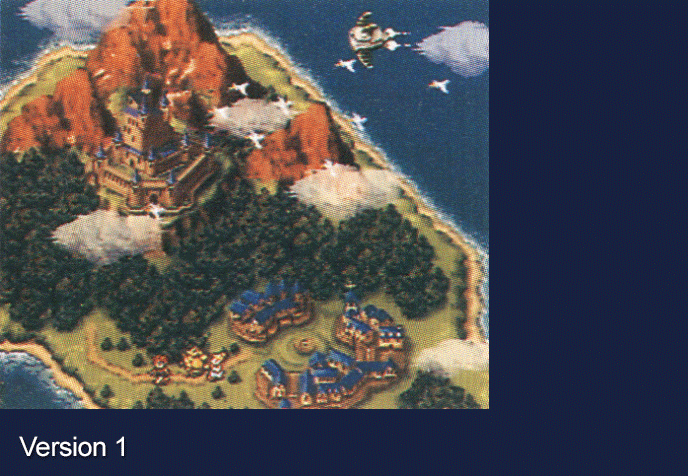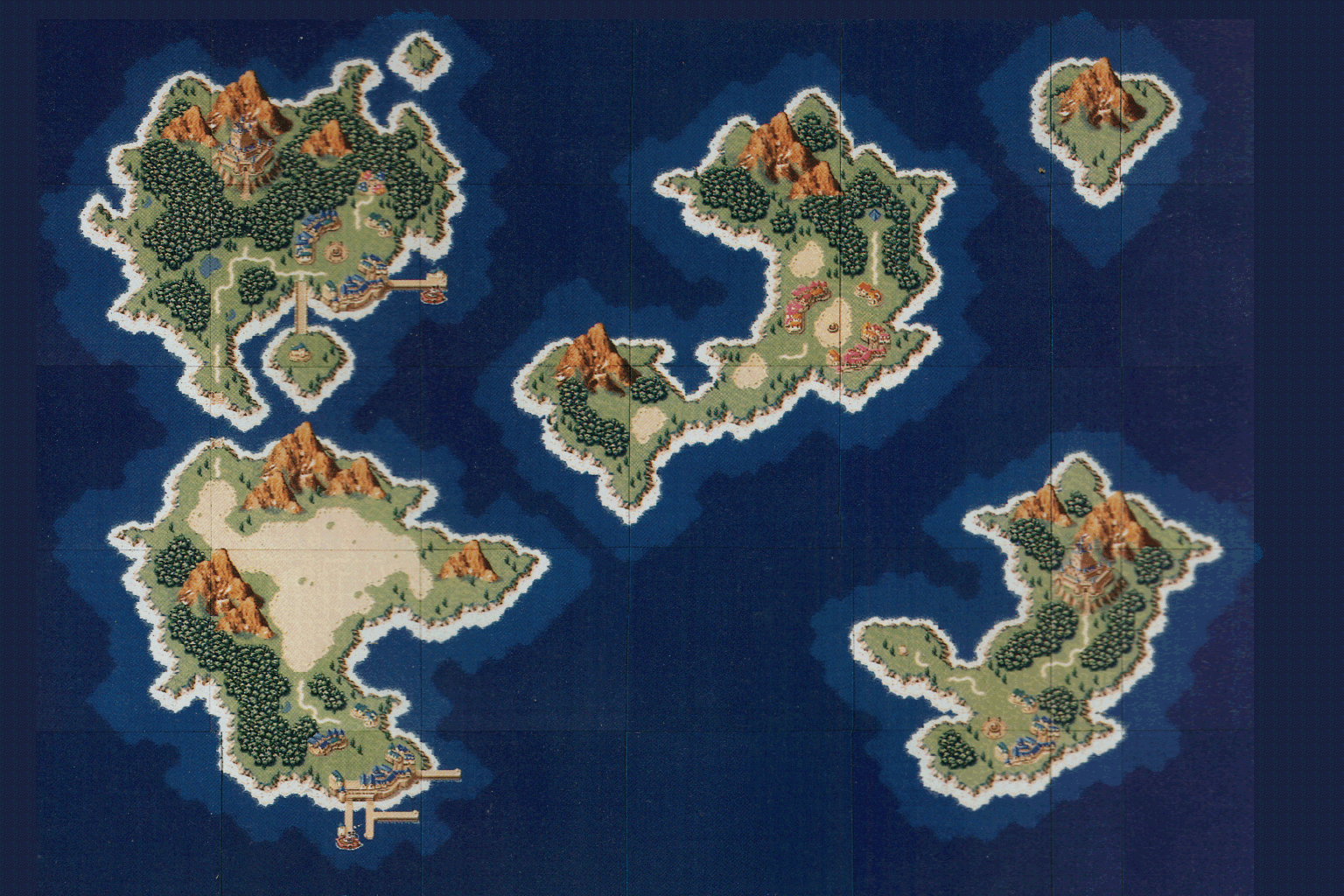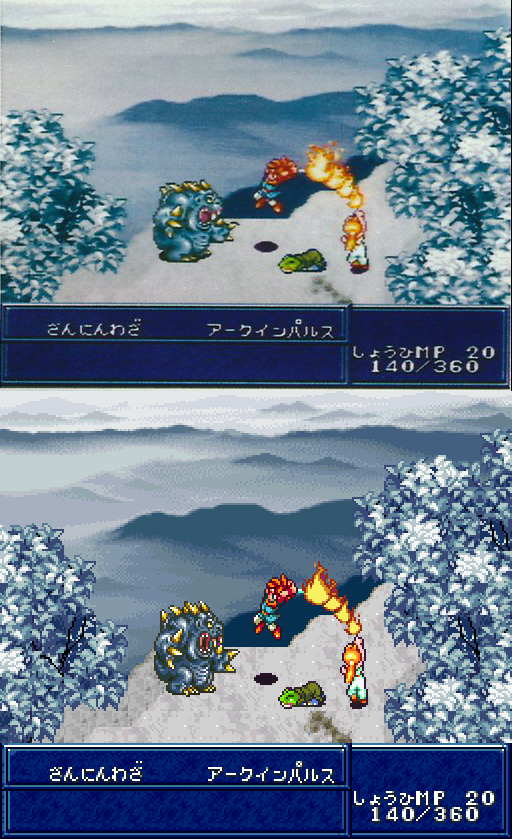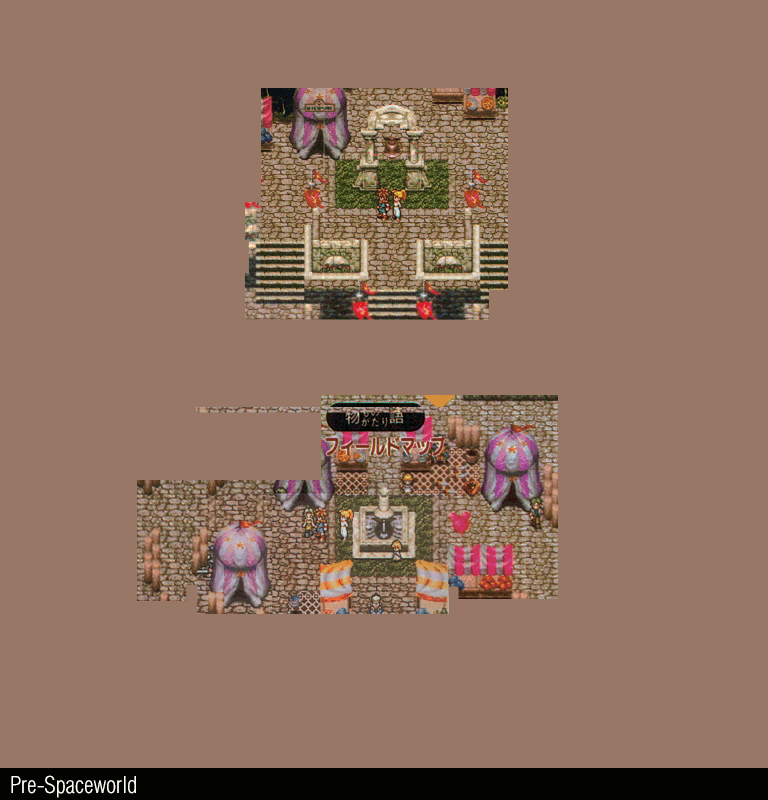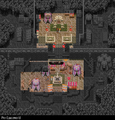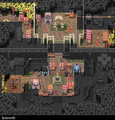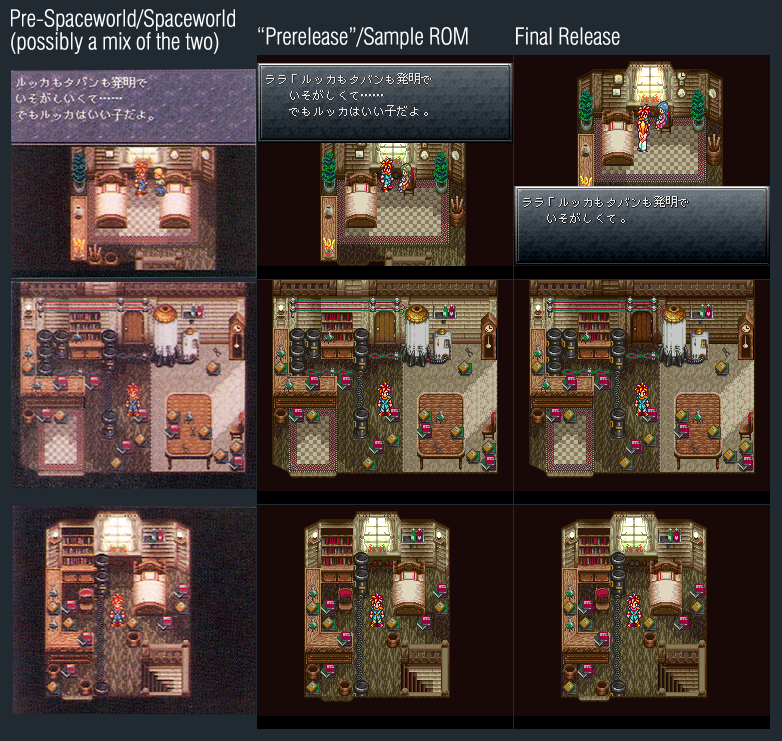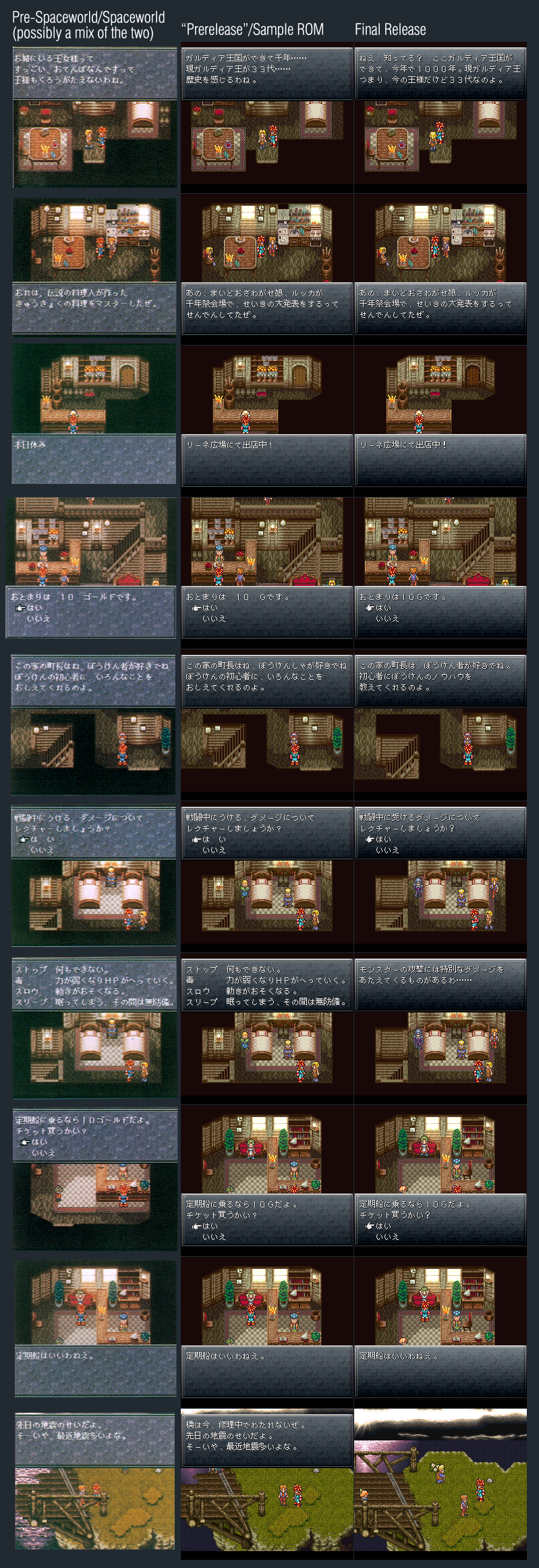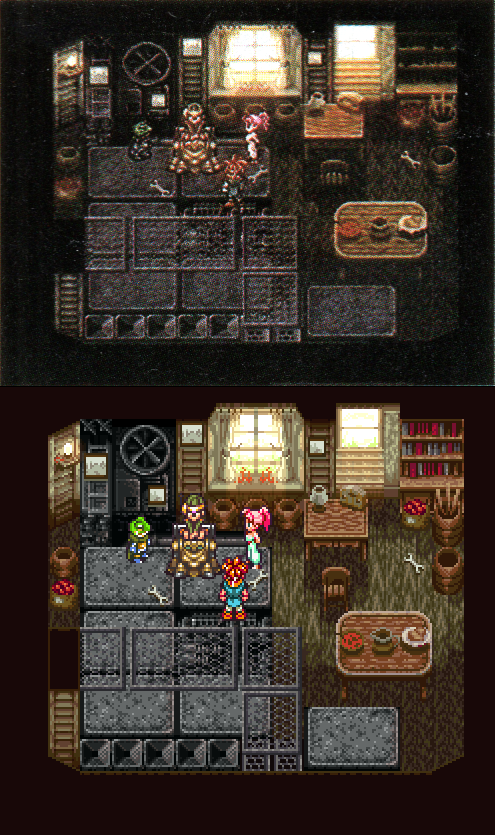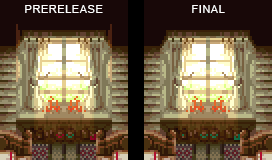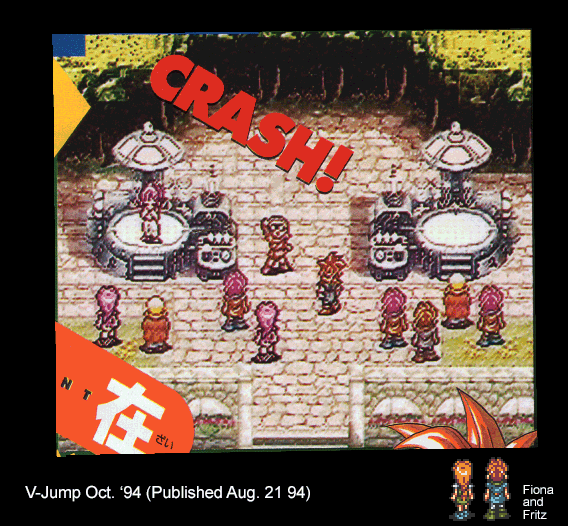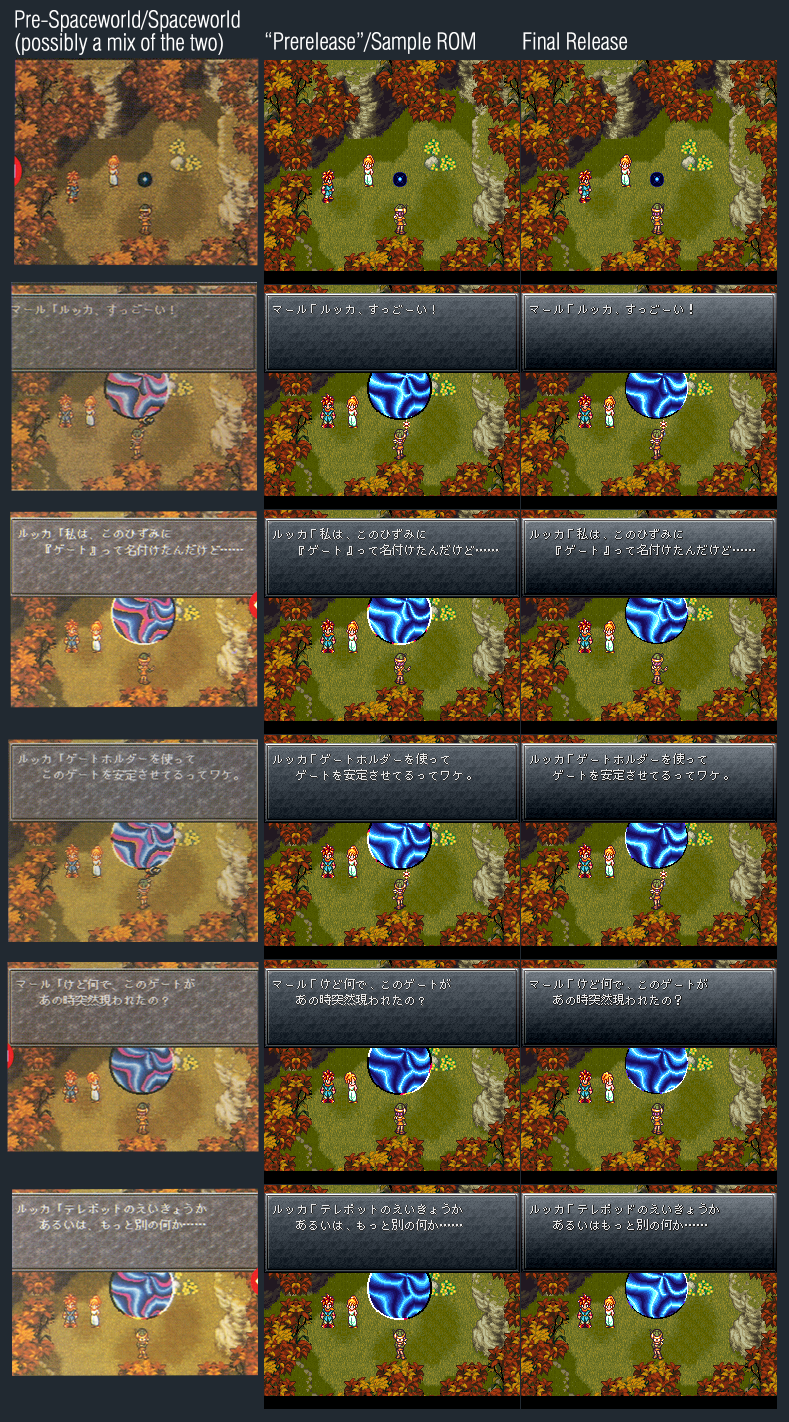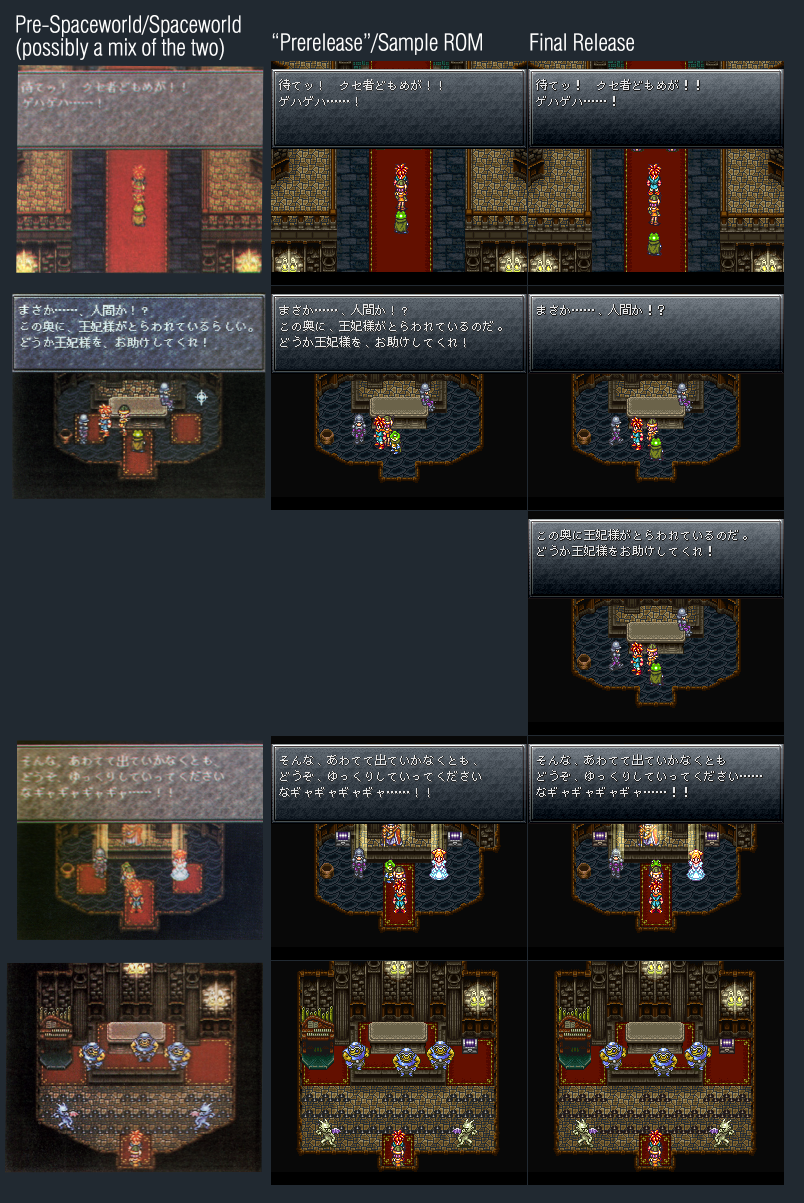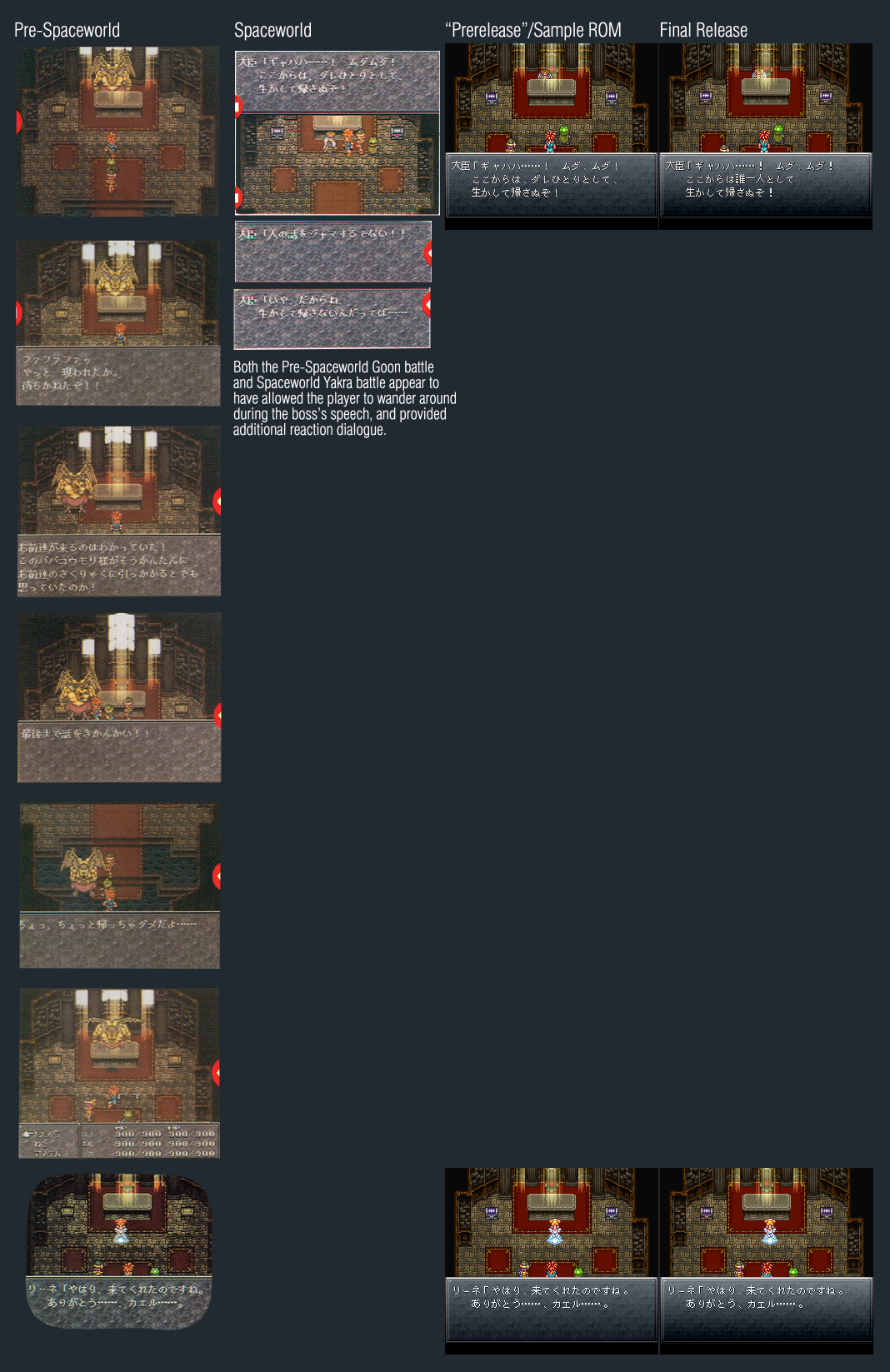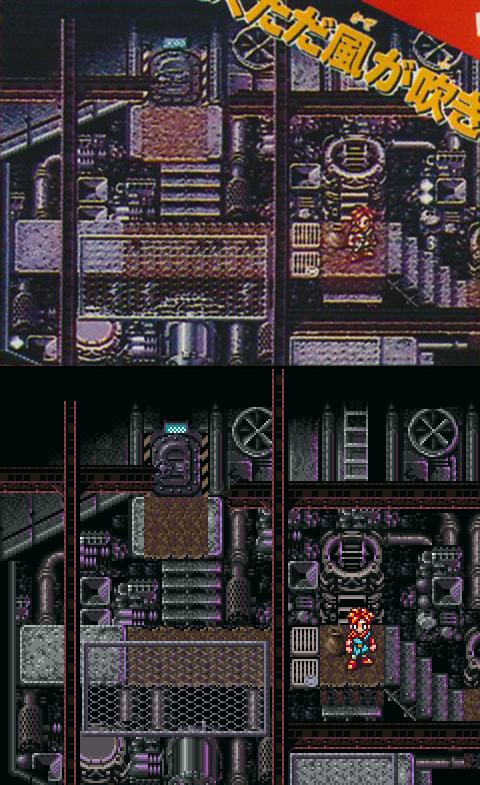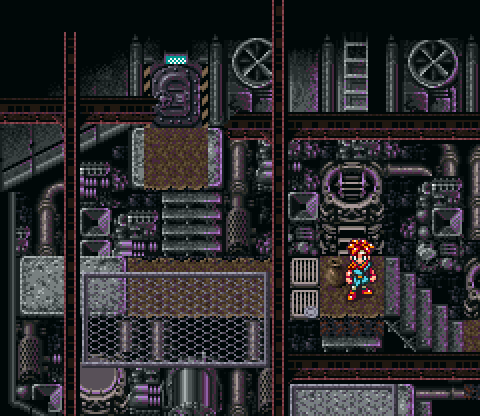Chrono Trigger Prerelease Coverage
This page catalogues all print coverage of Chrono Trigger of which we're aware, including coverage of earlier builds of the game (the "Prerelease", the "24-bit overworld" build, and even mockups). These builds, or in most cases, the screenshots themselves, were sent to magazines. Please note, modern (better) terminology correctly refers to the Chrono Trigger Prerelease as a prototype (not "beta" or prerelease), and any prerelease coverage is named that—prerelease coverage. Due to the incredible confusion it would cause in the Chrono community, we're keeping the old names for now. Thanks to ONSLAUGHT, Boullion Vincent, Legacy Crono, Reld. Huge thanks to Frank deWindt II for almost all the V-Jump scans.
Contents
[hide]- 1 Build Theory
- 2 Magazines
- 2.1 Trackers
- 2.2 Family Computer Magazine Famimaga, No. 17, August 26, 1994
- 2.3 Family Computer Magazine Famimaga, No. 18, September 9, 1994
- 2.4 Marukatsu Famicom, No. 14, September 9, 1994
- 2.5 V-Jump Festival 1994 Booklet, September 15, 1994
- 2.6 The Super Famicom, September 16, 1994
- 2.7 Dengeki Super Famicom No. 15, September 23, 1994
- 2.8 Marukatsu Famicom, No. 15, September 23, 1994
- 2.9 Weekly Famitsu, No. 301, September 23, 1994
- 2.10 Weekly Shounen Jump, September 26, 1994
- 2.11 EGM Issue 63, October 1994
- 2.12 Dengeki King, October 1994
- 2.13 Game On, October 1994
- 2.14 micom BASIC, October 2, 1994
- 2.15 V-Jump, October 1994
- 2.16 Marukatsu Famicom, No. 17, October 28, 1994
- 2.17 Weekly Shounen Jump, October 31, 1994
- 2.18 Family Computer Magazine Famimaga No. 22, November 4, 1994
- 2.19 Marukatsu Famicom, No. 18, November 11, 1994
- 2.20 V-Jump, November 1994
- 2.21 Video Games, November 1994
- 2.22 SuperGamePower Vol. 8, Nov. 1994
- 2.23 Nintendo Power Vol. 68
- 2.24 Family Computer Magazine Famimaga November 18, 1994
- 2.25 Weekly Famitsu, No. 310, November 25, 1994
- 2.26 Animage, November 1994
- 2.27 Dengeki King, November 1994
- 2.28 Game On!, November 1994
- 2.29 Game Walker, November 1994
- 2.30 Family Computer Magazine Famimaga No. 26, December 2, 1994
- 2.31 Overlord, December 2, 1994
- 2.32 Weekly Famitsu, No. 311, December 2, 1994
- 2.33 Weekly Famitsu, No. 312, December 9, 1994
- 2.34 Weekly Famitsu, No. 314, December 23, 1994
- 2.35 Weekly Famitsu, No. 315, December 30, 1994
- 2.36 Family Computer Magazine Famimaga No. 26, December 30, 1994
- 2.37 Game On!, December 1994
- 2.38 V-Jump, December 1994
- 2.39 EGM2 Issue 7, pp. 86-7, January 1995
- 2.40 Game On!, January 1995
- 2.41 V-Jump, January 1995
- 2.42 Dengeki Super Famicom, No. 2, February 10, 1995
- 2.43 Family Computer Magazine Famimaga, No. 03, February 10, 1995
- 2.44 Marukatsu Famicom, No. 10, February 10, 1995
- 2.45 Family Computer Magazine Famimaga, No. 04, February 24, 1995
- 2.46 Dengeki Super Famicom No. 3, February 24, 1995
- 2.47 Game Walker, February 1995
- 2.48 V-Jump, February 1995
- 2.49 Dengeki Super Famicom No. 4, March 10, 1995
- 2.50 Family Computer Magazine Famimaga, No. 05 March 10, 1995
- 2.51 Marukatsu Famicom, No. 04, March 10, 1995
- 2.52 Weekly Famitsu, No. 325, March 10, 1995
- 2.53 Tokyo Walker, No. 11, March 14, 1995
- 2.54 Weekly Famitsu, No. 326, March 17, 1995
- 2.55 Family Computer Magazine Famimaga, No. 06, March 24, 1995
- 2.56 Weekly Famitsu, No. 327, March 24, 1995
- 2.57 Weekly Famitsu, No. 328, March 31, 1995
- 2.58 Game On!, March 1995
- 2.59 Game Walker, March 1995
- 2.60 Monthly Famitsu, March 1995
- 2.61 V-Jump, March 1995
- 2.62 Marukatsu Famicom, No. 06, April 14, 1995
- 2.63 Weekly Famitsu, No. 330, April 14, 1995
- 2.64 Family Computer Magazine Famimaga, No. 08, April 21, 1995
- 2.65 Weekly Famitsu, No. 331, April 21, 1995
- 2.66 Gamest, No. 131, April 30, 1995
- 2.67 V-Jump, April 1995
- 2.68 Weekly Famitsu, No. 336, May 26, 1995
- 2.69 Gamest, No. 144, May 30, 1995
- 2.70 Game Walker, May 1995
- 2.71 Satellaview Tsushin, May 1995
- 2.72 V-Jump, May 1995
- 2.73 Monthly Famicom, June 1995
- 2.74 Nintendo Power, June 1995
- 2.75 Nintendo Power, July 1995
- 2.76 V-Jump, July 1995
- 2.77 Game Players, No. 74, August 1995
- 2.78 Satellaview Tsushin, August 1995
- 2.79 V-Jump, August 1995
- 2.80 Game Players, No. 75, September 1995
- 2.81 V-Jump, September 1995
- 2.82 Game Players, No. 76, October 1995
- 2.83 V-Jump, October 1995
- 2.84 V-Jump, November 1995
- 2.85 Game Players, No. 78, December 1995
- 2.86 V-Jump, December 1995
- 2.87 Game Players, No. 79, January 1996
- 2.88 V-Jump, January 1996
- 2.89 Game Players, No. 80, February 1996
- 2.90 Satella Tsushin, February 1996
- 2.91 V-Jump, February 1996
- 2.92 V-Jump, March 1996
- 2.93 V-Jump, April 1996
- 2.94 V-Jump, May 1996
- 2.95 V-Jump, June 1996
- 2.96 V-Jump, September 1996
- 2.97 V-Jump, October 1996
- 2.98 V-Jump, November 1996
- 2.99 V-Jump, December 1996
- 2.100 V-Jump, January 1997
- 2.101 V-Jump, February 1997
- 2.102 V-Jump, April 1997
- 2.103 V-Jump, May 1997
- 2.104 V-Jump, June 1997
- 2.105 V-Jump, July 1997
- 2.106 V-Jump, August 1997
- 2.107 V-Jump, September 1997
- 2.108 V-Jump, October 1997
- 2.109 Nintendo Power, September 2012
- 2.110 Unknown
- 3 Videos
- 4 Mockup Recreations and Comparisons
- 5 Chrono Trigger PSX Coverage
Build Theory
Games in development often have batches of prerelease material (screenshots, video coverage, etc.) released at specific intervals, which allows fans to identify which potential build or generation of the game was used to create them. Based on all the coverage collected below, we are currenetly theorizing that the following generations existed, based on some telltale signs:
- V-Jump Festival 1994 Video - The most ancient version. "Flat" overworlds, floating crystal islands, rough character sprites, etc. I suspect these actually represent various incremental builds, but there isn't really anything to distinguish them as the shots pretty much all came out at once. The only difference I can point to is that there are two shots of the earliest version of the telepod exhibit, one where the telepod is all black and white, and one where color has been added.
- Pre-Spaceworld
Gradientless dialogue windows. All Millenial Fair tents are closed. All Millenial Fair tents are purple. Taban wears a purple shirt and has blond hair. Gold chests in Manorial Cathedral. Manoria Cathedral Goon battle instead of Yakra.
- Spaceworld
This is the build that was shown off at Spaceworld 1994, as seen in the Brut Press video coverage. Gradientless dialogue windows. All Millenial Fair tents are closed. Some Millenial Fair tents are now blue. Taban wears a yellow shirt and has green hair. Purple chests in Manoria Cathedral. Yakra battle added.
- Post-Spaceworld
This one shows up in the second VJump promotional video. Gradient added to dialogue windows. Font still matches the Spaceworld build. Basically a build right between the Spaceworld build and the "Prerelease" build.
- "Prerelease"/Sample ROM
Font changed to near-final state. We all have access to this one so we're pretty familiar with it.
- Scene Build - As early as February 26, 1995, users of the scene bbs from which Chrono Trigger Scene Logs were taken possessed a copy of the game; it is unknown if this was a pre-final build. Someone attests in the logs that the game went gold on January 20, 1995, which matches the SNES lot check leak from Nintendo. This is supported by the Chrono Trigger V-Jump Player's Guide (emergency edition), which has a section on a few kids who were chosen in a prize drawing by V-Jump in to be able to play the game in February 1995 shortly before its release.
- Final Build
Dialogue window gradient refined. Gray pixels made much darker on font. Additional minor font changes. Obviously the build most people know best.
Thanks to Reld
Magazines
Trackers
Two Japanese trackers have assisted in our effort to track down and scan all print coverage. The first might be down: https://tgear99.info/doku.php?id=tag:chrono_trigger_sfc&do=showtag&tag=chrono_trigger_sfc The second is at https://labx8.org/magazines:pages:chrono_trigger
Based on these trackers, we have assembled the following list, with notes on whether the Compendium has obtained the scans or not:
Not obtained; there is no section for these on this page yet:
- 1994-09-02 - 週刊ファミ通 No.298
- 1994-09-09 - スーパーファミコンマガジン
- 1994-09-09 - 週刊ファミ通 No.299
- 1994-09-16/23 - 覇王
- 1994-09-23 - マル勝ファミコン No.15
- 1994-09-30 - The スーパーファミコン No.17
- 1994-10-14 - The スーパーファミコン No.18
- 1994-10-14 - 週刊ファミ通 No.304, page 56
- 1994-10-21 - 電撃スーパーファミコン No.17
- 1994-10-28 - The スーパーファミコン No.19
- 1994-10-28 - 週刊ファミ通 No.306, page 179
- 1994-10 - 必本スーパー!
- 1994-10 - 電撃少年
- 1994-11-04 - 電撃スーパーファミコン No.18
- 1994-11-04 - 覇王
- 1994-11-11 - The スーパーファミコン No.20
- 1994-11-11/18 - 週刊ファミ通 No.309, page 197
- 1994-11-18 - 覇王
- 1994-11-18 - 電撃スーパーファミコン No.19, page 8
- 1994-11-25 - The スーパーファミコン No.21
- 1994-11-25 - マル勝ファミコン No.19, page 25
- 1994-11 - コロコロコミック
- 1994-11 - 必本スーパー!
- 1994-12-02 - ファミリーコンピュータマガジン No.24, page 9, 173
- 1994-12-02 - 電撃スーパーファミコン No.20
- 1994-12-09 - マル勝ファミコン No.20
- 1994-12-09 - The スーパーファミコン No.22
- 1994-12-16 - 覇王
- 1994-12-23 - ファミコン通信 No.314
- 1994-12-23 - 電撃スーパーファミコン No.21
- 1994-12 - 電撃王
- 1994-12 - ゲームウォーカー, page 122
- 1994-12 - ゲーム・オン!, page 60
- 1995-01-06/20 - The スーパーファミコン
- 1995-01-06/13 - 週刊ファミ通 No.317, page 86
- 1995-01-13/27 - ファミリーコンピュータマガジン No.01-02, page 101
- 1995-01-20 - マル勝ファミコン No.01
- 1995-01-20 - 電撃スーパーファミコン No.02, page 14
- 1995-01 - 必本スーパー!, page 136
- 1995-02-03 - The スーパーファミコン No. 02
- 1995-02-03 - 週刊ファミ通 No.320, page 96
- 1995-02-17 - The スーパーファミコン No.03
- 1995-02-24 - マル勝ファミコン No.03
- 1995-02-24 - 電撃スーパーファミコン No.03
- 1995-02-24 - 覇王
- 1995-02 - ゲーム・オン!
- 1995-02 - 月刊週刊ファミ通
- 1995-03-03 - The スーパーファミコン No. 04
- 1995-03-03 - 週刊ファミ通 No.324
- 1995-03-10 - マル勝ファミコン No.04
- 1995-03-10 - 覇王, page 22
- 1995-03-10 - 電撃スーパーファミコン No.04
- 1995-03-17 - The スーパーファミコン No.05
- 1995-03-24 - マル勝ファミコン No.05
- 1995-03-24 - 覇王, page 99
- 1995-03-31 - The スーパーファミコン No.06
- 1995-03 - ゲームウォーカー
- 1995-03 - 必本スーパー!
- 1995-04-07 - ファミリーコンピュータマガジン No.07, page 95
- 1995-04-07 - 覇王, page 56
- 1995-04-07 - 電撃スーパーファミコン No.06
- 1995-04-14 - The スーパーファミコン No.07
- 1995-04-21 - 電撃スーパーファミコン No.07
- 1995-04-21/28 - 覇王
- 1995-04-28 - The スーパーファミコン No.08
- 1995-04-28 - マル勝ファミコン No.07
- 1995-04-28 - 週刊ファミ通 No.332, page 68
- 1995-04-28 - 覇王
- 1995-04 - ゲーム・オン!, page 83
- 1995-04 - ゲームウォーカー
- 1995-04 - 月刊ファミコン通信, page 28
- 1995-04 - 電撃王
- 1995-05-05/05-19 - ファミリーコンピュータマガジン No.09-10
- 1995-05-05/05-19 - 電撃スーパーファミコン No.07
- 1995-05-19 - マル勝ファミコン No.08
- 1995-05 - ゲーム・オン!, page 79
- 1995-05 - ゲームウララ Vol.01
- 1995-05 - 月刊ファミコン通信, page 99
- 1995-06-02 - 週刊ファミ通 No.337
- 1995-06-02 - ファミリーコンピュータマガジン No.11
- 1995-06-09 - 電撃スーパーファミコン No.09
- 1995-06-16 - ファミリーコンピュータマガジン No.12
- 1995-06 - Vジャンプ
- 1995-07-28 - ファミリーコンピュータマガジン No.15
- 1995-08 - 必本スーパー!
Additionally, Squareference writes that Marukatsu Famicom released June 9, 1995 (not in the above list, but another one we need to find) covers these questions:
p10-11
クロノ・トリガー
Q&A
・マールのペンダントがテレポッドに反応した理由は? (Why did Marle's pendant react to the Telepod?)
・ダルトンはあの後どうなった? (What happened to Dalton?)
・魔法王国ジールが消滅したあとサラはどこへ? (Where is Schala after the fall of Zeal?)
・ベッケラーとは何者なんでしょう (Who is Bekkler?)
・2が出るというウワサは本当ですか? (Is Chrono Trigger 2 coming out?)
など
Why did Marle's pendant react to the telepods? What happened to Dalton after that? What happened to Dalton after that? Who is Beckerer? Is the rumor true that there will be a second installment?
Obtained, but needs better scans or is incomplete; these are present on this page:
- 1994-09-09 - マル勝ファミコン No.14, page 26
- 1994-09-23 - 電撃スーパーファミコン No.15
- 1994-09-23 マル勝ファミコン No.15
- 1994-09-26 - 週刊少年ジャンプ
- 1994-10-28 - マル勝ファミコン No.17, page 22
- 1994-10 - ゲーム・オン!, page 30
- EGM Issue 63, October 1994
- 1994-11-04 - ファミリーコンピュータマガジン No.22, page 177
- 1994-11-11 - マル勝ファミコン No.18, page 24
- 1994-11-25 - ファミコン通信 No.310, page 78
- 1994-11 - ゲーム・オン!, page 47
- 1994-11 - ゲームウォーカー, page 130
- 1994-11 - SuperGamePower
- 1994-12-02 - 週刊ファミ通 No.311, page 21
- 1994-12-02 - 覇王
- 1994-12-09 - ファミコン通信 No.312, page 208
- 1994-12-30 - ファミリーコンピュータマガジン No.26, page 8
- 1994-12-30 - 週刊ファミ通 No.315, page 76
- EGM2 Issue 7, pp. 86-7, January 1995
- 1995-01 - ゲーム・オン!, page 94
- 1995-02-10 - ファミリーコンピュータマガジン No.03, page 8
- 1995-02-10 - マル勝ファミコン No.02, page 18
- 1995-02-10 - 電撃スーパーファミコン No.02
- 1995-02-24 - ファミリーコンピュータマガジン No.04, page 8
- 1995-02 - ゲームウォーカー
- 1995-03-10 - 週刊ファミ通 No.325, page 75
- 1995-03-10 - ファミリーコンピュータマガジン No.05, page 8
- 1995-03-10 - マル勝ファミコン No.04
- 1995-03-14 - 東京ウォーカー No.11
- 1995-03-17 - 週刊ファミ通 No.326, page 91
- 1995-03-24 - ファミリーコンピュータマガジン No.06, page 8
- 1995-03-24 - 週刊ファミ通 No.327, page 75, 93
- 1995-03-31 - 週刊ファミ通 No.328, page 21, 75
- 1995-03 - ゲーム・オン!, page 86
- 1995-03 - ゲームウォーカー, pg.118
- 1995-03 - 月刊ファミコン通信, page 32
- 1995-04-14 - マル勝ファミコン No.06, page 75
- 1995-04-14 - 週刊ファミ通 No.330, page 67, 187
- 1995-04-21 - 週刊ファミ通 No.331, page 58
- 1995-04-21 - ファミリーコンピュータマガジン No.08, page 14
- 1995-05-26 - 週刊ファミ通 No.336, page 155
- 1995-05 - ゲームウォーカー, page 44
- 1995-06 - 月刊ファミコン通信, page 46
Obtained and scanned:
- 1994-08-26 - ファミリーコンピュータマガジン No.17
- 1994-09-09 - ファミリーコンピュータマガジン No.18
- 1994-09 - Vジャンプ
- 1994-09-16 - The スーパーファミコン No.16
- 1994-09-23 - 週刊ファミ通 No.301
- 1994-10-31 - 週刊少年ジャンプ
- 1994-10 - マイコンBASICマガジン
- 1994-10 - 電撃王
- 1994-10 - Vジャンプ
- 1994-11-18 - ファミリーコンピュータマガジン No.23
- 1994-11 - Vジャンプ
- 1994-11 - アニメージュ
- 1994-11 - 電撃王
- 1994-12-23 - ファミコン通信 No.314, pg.82
- 1994-12 - Vジャンプ
- 1995-01 - Vジャンプ
- 1995-02 - Vジャンプ
- 1995-03 - Vジャンプ
- 1995-04-30 - ゲーメスト No.141
- 1995-04 - Vジャンプ
- 1995-05-30/06-15 ゲーメスト No.144
- 1995-05 - サテラビュー通信
- 1995-05 - Vジャンプ
- 1995-07 - Vジャンプ
- 1995-08 - Vジャンプ
- 1995-08 - サテラビュー通信
- 1996-02 - サテラビュー通信 1996年2月号 (Satella News)
Family Computer Magazine Famimaga, No. 17, August 26, 1994
Complete fluff piece. The author of the article speculates on the content of every screenshot; no real details.
Family Computer Magazine Famimaga, No. 18, September 9, 1994
Speculation about the battle system. No details other than the Telepod starting the game via the malfunction.
Marukatsu Famicom, No. 14, September 9, 1994
Speculation about the story and characters; no details.
V-Jump Festival 1994 Booklet, September 15, 1994
See also the section on the video itself later on this page. All thanks to Reld for getting these scanned.
The interview pieces don't really contain new information, and the editor speculates about the contents of the screenshots without any confirmed details.
The Super Famicom, September 16, 1994
We fed these into DeepL, but unfortunately, it seems the magazine writer had no idea what the screenshots were depicting. Almost every caption is some form of speculation on what's being depicted, and so we can't say with certainty what any of these settings are.
[時間移動に関係あり?の不思議な部屋] [Is this related to time travel? The Wonder Room] ここで神秘的な雰囲気をもつ、3つの部屋を紹介しておこう。ないかが転送されているように見えるけど、現時点でなまぅたくの謎だ。ゲーム上,重要な場面かもしれないぞ。 Here are three rooms with a mysterious atmosphere. It looks as if it's a transporter, but that's a complete mystery at the moment. This could be an important scene in the game. *床の形からすると、3つは別々の部屋にがんじ感じるけと、同じ部屋での連続した場面にも見える。 From the shape of the floor, it looks like there are three separate rooms, or a series of scenes in the same room. *中央の物体には、目や口らしきものが見える。ちょっとグロテスク。 The central object appears to have eyes or what appears to be a mouth. It is a little grotesque. *見れたのはモンスターらしい。少なくとも人間ではなさそうだ。敵か味方か? What we can see appears to be a monster. At least it does not appear to be human. Friend or foe?
Shinichiro Okaniwa is zerohime524 (a Chrono Trigger artist), and expanded upon the floating crystal map on Twitter. Sounds like it was meant for "antiquity" (12,000 B.C.)
ネットで見つけた古代編のボツマップ。ガラスでできた半透明の浮遊マップっていうお題が降ってきのですがSFCの仕様と当時の技量では全くもってムリでした。 pic.twitter.com/s34vq8EJ7z
— 524 (@zerohime524) 2017年4月21日
This is a rejected map of the ancient version that I found on the Internet. I was given the task of creating a translucent floating map made of glass, but with the SFC specifications and my skills at the time, I was completely unable to do it.
Dengeki Super Famicom No. 15, September 23, 1994
No real information of substance.
Marukatsu Famicom, No. 15, September 23, 1994
Weekly Famitsu, No. 301, September 23, 1994
Several tantalizing things here:
- 24 Megabit build overworld
- Crono's sprite has less-spiky hair
- Marle has her pink hair sprite
- Scene of a better-looking ruined future dome, with a different tileset (see mockup recreation section later in this article)
- Scene of Lucca's workshop
- Zenan Bridge with tombestones/graves (see mockup recreation section later in this article)
Weekly Shounen Jump, September 26, 1994
EGM Issue 63, October 1994
Moving on, Chrono Trigger was again featured (barely) in EGM #63 (October 1994).
The first and third images come from preview materials we've already seen, but the second image is fascinating. It shows Crono at the Ocean Palace entrance speaking to Schala and Janus; it's also possible that they're at the Sun Palace or another Zeal structure entirely, like an early version of Sealed Pyramid. It's possible that Schala and Janus were meant to survive the events of the Ocean Palace in Masato Kato's early planning; naturally, he would have changed this to avoid a temporal paradox and to set up Schala's involvement in future Chrono games. On the other hand, perhaps the Sun Stone recharging event happened before the Ocean Palace Incident in early planning. There appear to be two Moon Stones on either side of the group under columns of light.
Dengeki King, October 1994
The world of Chrono Trigger
The true identity of the giant RPG "Chrono Trigger", where the names of the masters line up from the beginning to the end.
The Dream Team. It may sound ironic, but such a phrase fits this game well. The character design is by Akira Toriyama, with Yuji Horii of "Dragon Quest" and Hironobu Sakaguchi of "FF" as supervisors. Chrono Trigger is the result of the combined efforts of three people at the pinnacle of SFC software production today.
It is easy to imagine that Mr. Sakaguchi and Mr. Crono must have been interested in each other's work. It is not known which of them approached the other first, what they talked about when they met, or any other details. However, that is how it all began. Horii and Sakaguchi held discussions, and Toriyama created a visualization of their image. This is how the three sensibilities that lead the game industry came together. When "Dracula" and "FF" divided the RPG world, "Chrono Trigger" may have been destined to be born. The game is a three-player RPG in which the player travels through time and space. Chrono is the Greek word for "time. Trigger is the trigger of a gun. The story is still under a veil of secrecy, but it is believed that a story using time travel as a trick is in the works. In Square's "Sa-Ga 3: Champion of Time and Space," released on GB in the past, the protagonists must go back in time to stop a fountain from appearing in the sky and flooding the world.
Yuji Horii's "Chrono Trigger" is sure to be even more complex, with more elaborate tricks and a fuller storyline. Akira Toriyama has put a lot of effort into the characters, and they are all very appealing. A wild primitive woman, a futuristic robot with arms equipped with weapons, a mechanic-like girl, a frog swordsman, and others. The party system is based on three characters, but players are free to choose from among those who have joined the party, which allows the player to feel a strong emotional connection to the characters. The huge RPG created by the "Guided Ones" is sure to captivate players like a magic spell. If they have an endgame in mind, it may be to revitalize the ailing SFC market. Will "Chrono Trigger" become a legend?
The vastness of the world of "Chrono Trigger" is verified through photographs.
The adventures of Chrono begin with a woman who enters a transfer device. A woman enters a transporter and is transported back in time.
A mechanical soldier is in the center of the screen. The monitor in the upper right corner of the screen
The monitor in the upper right corner of the screen is said to change images.
Crono and Frog Swordsman are on board. Although it is covered in dirt, it has enough power to transcend time and space.
The main characters travel through four eras: ancient, medieval, modern, and future. Not only time but also place can be moved.
Balloons are flying. In the "Ancient Times," a national festival is held. The square at the top of the screen This is the map for movement.
If this is the map for movement, the stage for adventure will be further expanded.
The game has a map for movement, on which you can easily move around by specifying your destination.
The possibility of being involved in a terrible incident the moment you leave town is great.
Factory of the Future
New friends
Ancient Morning
The crispness of the morning is common. Eira. Present, past, and future ▲A proto-woman asleep in a cave, ▲A woman with a
Face to face with livestock
The machine soldier robot is now one of our friends. and Eira are already friends ▲It seems they are ancient livestock.
Maybe it will have an impact on them?
The concept of religion is also thought to be a part of the game's development. The church seems to be a good fit for the game. The sound of a pipe organ is a medieval church.
Feel the breath of the world created by the masters!
Main character Chrono
His birth, age, and other personal information are unknown at this time. However, his sharp eyes and the Japanese sword in his hand indicate that he is someone who can do something.
Not "FF" or "Roma Saga"
There is a third trend here. Most of Square's games are based on their predecessors. FF", "Roma Saga", "Seiken Densetsu 2", and "Hanjuku Hero" were all created in the vein of "FF", "Roma Saga", "Seiken Densetsu 2", and "Hanjuku Hero". However, "Chrono Trigger" is the first spring that Square says will create a third stream completely different from the two major streams of the SFC, "FF" and "Roma Saga". Let's analyze the system that makes the difference. At first glance, the combat looks like "Seiken Densetsu 2" (The Legend of the Holy Sword 2).
Fighting
How do you command your enemies? How do you deal with the enemies? You can see that you can choose to battle with the monsters guarding the bridge that attack you from above, below, left, and right.
You can see that you can choose. Compared to the photo in the previous photo, the window character's movement is smoother.
It may be possible to use it differently. with their opponents in battle.
I have 4 weapons. I mean...
The screen looks like a "look down" type of action, but as the window at the top shows, it is a command selection type. Special commands such as "RENKEI" and "WAY" are commands to use each character's own techniques. The status screen is devoid of complex parameters. The character "Heaven" next to the main character's face seems to represent his attributes. The visual below it also seems to display the attributes of Fire, Water, and Heaven and Earth. Is there some kind of trick hidden in this screen, such as the ability of the main character being enhanced by the combination of attributes?
Time travel is a major theme in science fiction.
There are many masterpieces. Heinlein's "The Door into Summer" (Hayakawa Bunko) and Yasutaka Tsutsui's "The Girl Who Leapt Through Time" (Kadokawa Bunko) are well-known works. The film "Back to the Future" and "The Girl Who Leapt Through Time" by Yasutaka Tsutsui are also well-known. The "Back to the Future" and "Time After Time," based on Wells' novel, are also well known in the film industry. The clue to the "Chrono" trick may be hidden in his future works.
Game On, October 1994
Need better scans.
micom BASIC, October 2, 1994
"DRAGON QUEST" and "FINAL FANTASY" are two of the most famous video game franchises in the world, and there are probably no video game fans who do not know their names. With two completely different production concepts, these two titles are rivals and were thought to be inseparable. However, a new title has been announced that will change all of these users' minds. It is called "Chrono Trigger. Character
Fighting is command-based.
Although at first glance it appears to be a "Seiken"-style title, it is a dream come true, with the game designed by Akira Toriyama and supervised by Yuji Horii and Hironobu Sakaguchi, two of the game's most famous directors. Although the detailed story has yet to be revealed, "Chrono Trigger" is an RPG that spans the past, present, and future to complete various events. During your journey, you will find companions to share the adventure with and form a party (choose three out of a total of six) to face the enemy according to the situation. Y
The game's graphics, based on light and dark tones, are introduced here. The beauty of the graphics is breathtaking. The picture on the right may be a scene from an event. You can almost hear the murmur of the river and the rustling of the trees.
SQUARE RPG Price undecided Release date undecided
What should be noted is the beauty of the graphics. Take a look at the picture below. The sun shining through the trees reflecting on the water, the light floating in the darkness ・・・・・・. This fantasy of light and darkness will surely create a new drama. ( Kyoko Nakamura )
V-Jump, October 1994
No details about the contents of the screenshots are revealed.
Marukatsu Famicom, No. 17, October 28, 1994
Weekly Shounen Jump, October 31, 1994
Thanks to Reld
Notably shows:
- Robo racing an empty Jet Bike in Mode 7
- Blade-armed Zombor on Zenan Bridge (narrower bridge; grass on right)
- Screenshot of Truce, which has a building with a church steeple and cross on top (initial Manoria Cathedral?)
- Excellent quality mock-up of the snowy mountain Heckran battle that was the basis for the cover art of the game
Crono has equipped:
- Father's Katana
- Leather Hat (on his torso apparently)
- Leather Clothes (on his head?)
- Holy Ring
Family Computer Magazine Famimaga No. 22, November 4, 1994
Marukatsu Famicom, No. 18, November 11, 1994
V-Jump, November 1994
Priority for translation; interview. They seem to just talk about the features of the game, but Yuji Horii mentions the hotel stay where he was invited by Square to brainstorm details of the game (see May 3, 2015 - Shueshia Interview with Hironobu Sakaguchi and Yuji Horii).
Video Games, November 1994
Download the entire magazine here.
SuperGamePower Vol. 8, Nov. 1994
Crono's hair is different; it lacks the usual spikes. The status screenshot shows a count of "5" for each of the four elements, suggesting that characters may have different charges or levels of elemental power despite having a primary element affinity. The Epoch is flying over the ground, and jet vapor seems to be coming from two exhaust pipes. The details of the Arris Dome are also a little different. Thanks to Ricardo C and RetroAvengers
Nintendo Power Vol. 68
This issue was released in 1995, but covered the Shoshinkai that was presented November 1994.
Family Computer Magazine Famimaga November 18, 1994
Thanks to Reld
Weekly Famitsu, No. 310, November 25, 1994
Animage, November 1994
Dengeki King, November 1994
Time Travel Let's Go! The pilot, Crono, is going to see the future of mecha! A fight between the two sends the shaken machine adrift to an unscheduled time... What is the fate of the three?
I asked. "Hey, where do you want to go?" "To see our ancestors in the past.
To the past? To the future? Wherever you go, there's no fear if you have the courage!
The battle system that mixes the advantages of action and command has been unveiled!
No control errors even though you are moving! The battle scene is just as you see on the action-style screen.
As you can see, the battle scene is just like an action-style screen, but in reality, the characters move and attack the enemy according to the commands entered. It is a revolutionary system that perfectly combines the realism of action with the precision of command-based fighting. But don't be surprised just yet. The mysterious command "RENKEI" has been revealed. The photo sequence on the right shows the use of the "Vic Tornado" linkage. You can clearly see how the characters scattered across the field gather and join forces to create a powerful tornado.
I see that the three of them are working together to perform the technique, so it is called "RENKEI," and once that is done, there is no need for the final boss. There are still many unknowns in RENKEI. First of all, there are variations of techniques. The Big Tornado is clearly a wind element. It would not be surprising if there were water, fire, earth, and other types of techniques. In terms of format, it is only natural to have techniques that are effective against single enemies, but if there is a technique that is effective only against enemies in a triangle formed by three characters, it would also be necessary to have a strategic approach. The "Sannin no Waza" cannot be used if a fighter is ineffective, and the coordinated techniques that appear for the first time in a square RPG are very deep. The "technique" commands that work on a single character are still a mystery. What are they?
My alter ego in the game
Eira
A primitive woman living robustly in a primitive age. Her body, peeking out from her revealing costume, seems to be covered in muscle rather than fat. A powerhouse fighter who fights by swinging a large club around?
Robo
Robots produced in a factory in the future. It was designed as a partner to work alongside humans. Equipped with an attachment in its left hand, it can be very powerful in some cases.
Time travel always brings with it a certain amount of difficulty. One of the challenges of time travel is the ability to communicate with the inhabitants of the time period in which you arrive. If you travel to the past, it will take time to understand where you are coming from and why. If you visit the future, you may end up stuffed and displayed on a bookshelf in a museum! Part of the fun of the game is coming into contact with characters who live in different time periods. Different eras may dress differently and think differently. The characters who are supposed to be your friends may turn their backs on you at first, but when you party with Crono, your fate is sealed. But if they are destined to party with Crono, then there must be a force at work.
Merle
A ponytail and a winning look in her eyes. This girl is actually Crono's girlfriend. Although she entered the material transfer equipment, she was sent to the other side of the time-space and never returned. Her specialty is a bowgun, which can be used for indirect attacks.
Lucca
A girl from the near future who is good at tinkering with machines and inventing things. She sometimes invents machines that are useful in battles and solving riddles. The helmet with the protruding antenna also seems to have many secrets hidden in it. .........
Frog
His nonchalant face is his trademark. But he is not to be underestimated because he is a frog. His swordsmanship is first-rate. He is waiting for the hero in the medieval world, but beware that he may be in hibernation if you go there in winter.
Crono
As the title says, he is the hero of this game. Crono's adventures begin in pursuit of Marle, who has gone missing. His main weapon is a sharp Japanese sword, which he uses to slash down enemies that swarm around him.
The most likely scenario is that the other character is involved in a terrible problem and starts to solve it with Crono. The character who gets to know Crono well may offer to cooperate. Or perhaps they discover that the root of the problem is the same as Crono's purpose and join the party. Either way, they come to the Chrono's party with their own dramas. No one joins a tough fight, where they may lose their lives at any moment, just for the fun of it. The drama and will of these characters add depth to the story. Bonds and friendships between the characters are sure to emerge during the adventure. The game will not end with a surprising story that uses time travel tricks. No, "Chrono Trigger" must not end.
Game On!, November 1994
Game Walker, November 1994
Family Computer Magazine Famimaga No. 26, December 2, 1994
The graphics for the Choras ruins haven't been finished yet apparently, and so Guardia Castle is reused in their place. Page 5 was particularly interesting, as it shows what appears to be the boss battle from Manoria Cathedral, but with a Goon (Papa Bat) instead of Yakra. We've seen at least one shot of this before, but these go into a bit more depth. I did one of my hack-job translations on it, which is enough to get the gist of what's going on. Basically it's a demonstration of the "ATEL" event system, which is what they were calling the ability to wander around while a dialogue box is open. Apparently the Goon would actually react to you doing that during his monologue. On the same page you can see an earlier gate key graphic. It shows up in at least one of the old VJump scans that are already on the Compendium, but I'd never noticed it before personally. Kinda looks like a weird gun or something.
On page 6 is an earlier version of Lucca's mom Lara. Just a generic old lady sprite. She appears to be standing, but since she's kinda half overlapping the bed maybe she was meant to be sitting on the edge of it. The door to the balcony area is blocked with pots for some reason. Looks like she and Taban were sleeping in separate beds too.
On page 7 you can get a look at Melchior's Millennial Fair inventory, and there's an old man selling accessories near the tent where you can exchange silver points in the final. Silver points were apparently not a thing in this version, as you can also see that fighting Gato will win you 100 gold instead of 15 silver points. There's a little blond boy where the old man sitting down to his lunch should be. Can't see if the lunch is there or not. There's a barrel near the drinking contest guy. It's a sprite, which would sort of imply that it'd be interactive. Maybe it's the drinking contest guy's "keg", and you could opt to drain it or something, which would play into the trial later. Could also be a debug object, or just purely for decoration.
Overlord, December 2, 1994
Weekly Famitsu, No. 311, December 2, 1994
Weekly Famitsu, No. 312, December 9, 1994
Weekly Famitsu, No. 314, December 23, 1994
Weekly Famitsu, No. 315, December 30, 1994
Family Computer Magazine Famimaga No. 26, December 30, 1994
Most of the new shots in this one seem to come from the "Prerelease"/Sample ROM build, but there are a few interesting older ones.
On page 5, there's a shot of an old 65,000,000 BC overworld that doesn't really seem to match up with anything that made it to the final build, and it features a couple of the unused overworld sprites. I don't think we've ever seen those in action before. Seems like it's a representation of the Ioka meeting site events. Next to that are a couple of shots of the Dactyl Nest looking pretty Algetty-esque. I kinda suspect that the Algetty tileset was originally meant for 65,000,000 BC.
On page 13 at the bottom there are a few shots of the Fake Chancellor just before the Yakra battle, and it seems to indicate that the whole ATEL wandering around and getting a reaction thing was still in play at this point. I actually ended up trying it in both the "Prerelease" and the final version because I thought maybe I'd just forgotten or never tried it, but you're definitely locked in place during his monologue in those versions.
There are some relatively large early world maps in this one.
On page 21 you can see more clearly that the brown pyramid in 600 AD is in fact just a brown version of the pyramid and not some unique graphic. I think I know what happened there. In the "Prerelease" and the final game the pyramid has its own palette entries, but the values for the shades of blue are identical to the shades of blue used in 1000 AD roof tiles. I think the pyramid originally shared a palette with those roof tiles, and since the equivalent roof tiles in 600 AD are brown the pyramid turned brown as well. So basically just a technical oversight that was later corrected.
On page 23 you can see that the sewer access is missing from the 2300 AD map.
There are a bunch of tiny differences in the 65,000,000 BC overworld on page 24. For example, if you look at the top right screen shot on that same page and compare it to the world map at the bottom you can see that the little guard tower thingy was originally a bush.
Game On!, December 1994
We ran the gallery through DeepL, but it didn't have anything interesting (the editor is merely speculating what's shown in the screenshots).
V-Jump, December 1994
EGM2 Issue 7, pp. 86-7, January 1995
Many of these screenshots seem to be taken from the mock-ups made for the prism cards).
On the first page, the Giga Gaia battle is clearly taken from the One Peaceful Day scene prism card mock-up. The EGM writer also claims that Crono is from a town called "Stoal", a reversal of the Japanese character; Truce = トルース (Toruusu) while Stoal = ストール (Sutooru). The tiny character images near their descriptions are taken from other screenshots and mock-ups in the article.
Things get interesting on page two. In the upper left, there's an early screenshot of a Heckran battle; the battle menu is very rough. The battle is clearly meant to show the cover art of the game, and it features a mountain tileset that doesn't appear in the final version of the game or the Chrono Trigger Prerelease (it's quite beautiful with snow-covered leaves). In the next screenshot to the right, the party's fighting a Goon in a forest setting (this isn't on any of the cards). And to the right of that is the scene from the All Star Cast card. The next row of screenshots begins left with an image of the Epoch flying over Guardia Kingdom in 1000 A.D.; interestingly, there's no western landmass leading to Zenan Bridge, but there does appear to be extra eastern landmass. To the right of that is the Epoch Lucca prism card scene, followed by the Riding the Pterans scene. The final row begins and ends with a tall image of Magus's castle and an image of the courtroom, respectively; the courtroom image is what the The Silvard scene card is taken from, and this EGM issue allows us to see that King Guardia XXXIII is the one sitting above the judge. Between these two tall images are three screenshots; the first shows the Telepod experiment. The second shows the party fighting a Goon in Manoria Cathedral with dialogue (which is completely new), and the third shows the party running around the early version of Algetty with Ayla seemingly pasted in the lower right corner in her victory pose (this is probably a mock-up image).
Game On!, January 1995
V-Jump, January 1995
Note that the January 1995 issue allegedly contains a Q&A with Biggs and Wedge, where they joke about getting transported across dimensions to the Chrono Trigger universe. Original link is here. If someone could provide the actual scan, it'd be great!
--Valigarmanda made you both disappear... so are you dead? Biggs: We traveled through dimensions and ended up in Leene Square in Chrono Trigger! Wedge: Bekkler found us and now we have new jobs. (haha)
Dengeki Super Famicom, No. 2, February 10, 1995
Family Computer Magazine Famimaga, No. 03, February 10, 1995
Marukatsu Famicom, No. 10, February 10, 1995
Family Computer Magazine Famimaga, No. 04, February 24, 1995
Dengeki Super Famicom No. 3, February 24, 1995
A real mishmash of screenshots from different builds in this one, and some more world maps. The world maps seem to be mostly consistent with what's in Famimaga 26, except for the colosseum island in 2300 AD on page 4. It's near the middle of the map instead of in the bottom left corner. I kind of wonder if this was a mistake made when stitching the screenshots together to make the map. You can see the seams around the individual shots used, and that island is all by itself in its shot, so there wouldn't really be anything misaligned to give it away if they put it in the wrong spot. If it's legit, I'd place it as slightly earlier than the one in Famimaga 26.
The Crono Back to the Future 2-style explanation of the timeline art is probably done by the magazine, but there's also unique art of the Mystical Knights (Ozzie, Slash, and Flea).
Game Walker, February 1995
V-Jump, February 1995
Reld: I found and scanned the "Atsusugiru souryoku tokushuu Appendix". It's a little booklet, like a mini magazine, that came with the Feb. '95 issue of V-Jump. It's a little weird how they did it. The open edge of the front cover was bound into the spine of the main magazine with a perforated edge so you could tear it out (which I ended up doing so I could scan it). I did them all up as two-page spreads and tried to make them presentable. The quality of the print and the paper wasn't great, and mine was a little stained along the top edge from exposure to something. They seem to count the cover as a page, which is why my page numbers start at 2.
Several old world maps in here. I believe these actually predate the full 1000AD map from Famimaga that I posted before. The 1000AD map at least appears to be "version 2" from my little comparison GIF. I'm assuming the other maps probably come from the same build.
The sealed pyramid on the 600AD map appears to be brown instead of blue. This was true in the tiny map Vehek mentioned upthread too. Maybe it was supposed to be buried in 600AD? Or maybe they just hadn't finalized the palette for that map yet. It's too hard to tell if the graphic is actually different or not. Fiona's Villa and Fiona's Shrine both appear south of the desert, although the little key for the 600AD map on page 11 indicates (erroneously I assume) that Fiona's Villa is in the northeast corner of the continent instead. The change in the surrounding forest between 600AD and 1000AD seems really minimal compared to the final game.
For some reason Choras is called "Choriso" (チョリソー/Chyorisoo) in 600AD. It's still Choras (チョラス/Chyorasu) in 1000AD. Another error? The unknown house in Medina is labeled as Melchior's hut. Melchior's hut isn't in the Prerelease/Sample ROM at all, is it? And I think that unknown house had a different interior and associated dialogue for an imp. Maybe it became Melchior's hut later? Or maybe the person doing the labeling just got confused because the map in the screenshot was outdated. Ozzie, Slash, and Flea in the mayor's manor in Medina on page 10. There are more screenshots from this location on this page of the main Feb. 95 magazine. I did a quick hack-job translation with DeepL. The dialogue in those screenshots is this from Text Block 07 3BB400-3BD43B in the Prerelease/Sample ROM:
Bronze Statue
[Green Imp]
この広場のまんなかにあるのが
魔王様のどうぞうだよ。[END]
[Green Imp]
The thing in the middle of this square is
a bronze statue of the demon king.
Ozzie VIII
ワシがこのメディーナ村の村長、
ビネガー13世じゃ!
ワシの先祖は、あのいだいなる魔王様の
一の部下として人間どもと戦ったのだぞ。
ああ、魔王様…… なぜ400年前に
人間達をほろぼして下さらなかったのじゃ?[END]
In the Prerelease, he was known as Ozzie XIII instead of Ozzie VIII.
Slash and Flea, Weiner and Ketchappa
[Weiner (Slash)]
オレは、ワイナー。
魔族がその力を取り戻す日にそなえて
剣の修行にいそしんでいるのだ。[END]
[Ketchappa (Flea)]
私は、ケチャッパ。
日夜、魔王様をあがめて、魔族がこの地を
手に入れる日を願い続けているのよ。[END]
[Weiner (Slash)]
I am Weiner.
To prepare for the day when the demons regain power,
I'm working hard on my swordsmanship.
[Ketchappa (Flea)]
I am Ketchappa. Night and day the demons worship the
demon king, continuing to pray for the day when the
our kind will gain control of the world.
So I guess Wiener and Ketchappa weren't early names for Slash and Flea. They're the names of Slash and Flea's descendents who once lived in Medina with Ozzie XIII. The unknown village in 65,000,000BC gets a label on page 13! Buuuuut... it just says "tent". One more thing I thought might be worth mentioning is that these V-Jump magazines did not come out in the month that's on the cover. The Feb. '95 issue for example came out Dec. 21st 1994. This date is in the back of the Jan. '95 issue telling the reader when the next issue will be out. I bring this up because that means despite being dated only a month before the game's release, all of the content in this issue is from at most about a month after the Prerelease/Sample ROM build.
Dengeki Super Famicom No. 4, March 10, 1995
Chrono Trigger" Development Team Special Report! Interview
Dengeki interviewed six development staff members who successfully completed the master ROM. They told us all about their thoughts on "Chrono Trigger". The staff of "Chrono" consists of about 60 people That's 1.5 times as many as for "FF".
Chrono is a CD-ROM game?! Chrono was released on CD-ROM?
First of all, please tell us how "Chrono Trigger" started as a project.
Kazuhiko Aoki (Producer): Yes, that's right. It was four years ago that Hironobu Sakaguchi, Yuji Horii, and Akira Toriyama decided to collaborate on an RPG. At the time, it was just an idea that we could work together. Then, two years ago, we started working on a full-fledged project. Mr. Horii and my staff members stayed together and worked out a rough outline of the storyline and other details.
From that stage, was it decided that it would be a time travel story?
Aoki: Yes. Actually, this project was initially planned to be a CD-ROM project. The hardware features of the game were to be the main features of the game, and we were to have total control over the game and battle scenes.
(Mr. Hiroki Chiba - Directing the tor scene. In charge of planning. Bug catching for event battles.)
We had a hard time! We wanted to make a game that took advantage of the large capacity of the CD-ROM to explore many worlds, so we decided from the very beginning of the project that it would be a time travel game with different maps for each era. In the end, we decided to release the game on a ROM instead of a CD-ROM. But since it was 32 megabytes in size, we were able to accomplish most of the things we had planned to do with the CD-ROM.
How were Mr. Sakaguchi, Mr. Horii, and Mr. Toriyama involved in the project?
Aoki: Mr. Horii worked with our staff on the outline of the scenario. He was very strict in checking the dialogue. He would say things like, "This character doesn't speak in this way. We ordered several image illustrations from Mr. Toriyama and asked him to create a clear worldview for the game as a whole. Our Mr. Sakaguchi was like an opinionator who looked over the game as a whole. The specific tasks were handled by our staff, which totaled about 60 people, or about 1.5 times the size of the "FF" staff. I don't think we will ever have such a large group of people again. In that sense, this work is the crystallization of the teamwork of the entire staff.
Powerful event battles change RPGs! Did you have a lot of trouble with the battle scenes that are the hallmark of "Chrono"?
Hiroki Chiba (Planning): Yes. Everything from the timing of encounters to the appearance of enemies was done by hand. The battle scenes were all handmade, so it was a lot of work. The map screen became the battle screen as it was, so if the terrain changed, the entire battle had to be redesigned.
Shinichiro Hamasaka (Map Graphic Designer) Yes. I created the map of the inside of the Demon King's castle, and from that stage on, it was a joint effort with the planning staff. Normally, the person in charge of maps and the person in charge of battles are allowed to work separately. It really is a game that was created by everyone. I want you to take a good look at the inside of the Devil's Castle.
Mr. Masaki Hoshino - His movements are all done by him, and I want you to pay attention to the way his personality oozes out. He is in charge of character graphics.
The theme of "Chrono" was Namida!
Yasunori Mitsuda (Music): The same can be said for the music. The sound that matches the battles and the characters' movements is very important. This time, we were able to create 68 songs for the 32-megapixel game, and we put a lot of emphasis on matching the music with the events. The theme of "Chrono" is Namida, so we have songs that will make you cry. -Indeed. The scene in the future where the robot is bullied is a very touching one.
Aoki : Yes. It's still a secret, but we have prepared a lot of scenes like that for you to look forward to. "Chrono" was created with the concept of creating less frustration and more excitement. That's why we kept the number of battles to a minimum. You can even skip most of the battles. In that sense, I think players will be able to fully enjoy the story.
Since it is an hour-long game, you have prepared many events using time slips, haven't you?
Aoki: Yes. In this game, it is not only important where things are happening, but also "when" they are happening. In other words, it is important to search not only along the horizontal axis of location, but also along the vertical axis of time. So, I think you will be able to play the game with a fresh sensation that is different from that of a normal RPG. For this reason, we were careful to avoid time inconsistencies in the scenario design.
Focus on faithful reproduction of Toriyama's world
What is the world of Toriyama?
Tsutomu Terada (monster graphics): Yes, we created the monster designs from Toriyama's illustrations, but it was difficult to create the actual enemy graphics that move around. For example, the backs of the monsters are not drawn in Mr. Toriyama's illustrations. The bosses were also designed by Mr. Toriyama. Monsters are easy to kill. I want you to stare at them. Is it good? I designed those parts as if I were Mr. Toriyama himself. I can't speak specifically about the design of the last boss, but there was a lot of internal debate about how to bring out Toriyama's colors.
Masaki Hoshino (Graphic Director): On the contrary. I even gave an order to Mr. Toriyama's side for the way the event and music were fused together. I hope you will pay attention to it. As for Eira, she was originally designed by Mr. Toriyama as a female with straight hair. However, we decided that a primitive ogo should have wild wavy hair, so we had her redrawn (laughs). (Laughs) So I have a lot of feelings for the six main characters. The large volume of the film allows for very detailed movement of the characters. Each character's personality comes through in their movements. I like the way the earnest Lucca walks briskly with her glasses back on. I hope you will pay attention to such details.
Please let me know if you had any episodes of trouble during development.
Aoki: During development, we had a strange incident in which the host computer suddenly became unable to read a file, and development was halted. Files are saved with the date and time they were created, but somehow this date and time had changed to the 1960s. So the file was no longer readable.
Let's clear things up before the launch!
The release date is just a few days away. I'm sure everyone is counting down the days and dreaming of playing it. If you're itching to play it, haven't you been pulling out your Dengeki back issues to check out the Chrono information again? If you do, you will find a lot of interesting information that has been left out of the recent past. For example, the new ATEL conversation system. Here, we will recheck such "what's going on? Here, we'll recheck some of those.
Where is the ATEL?
ATEL was a revolutionary conversation system where the other person's response (conversation) would change depending on the actions taken during the conversation. However, there are many multiple developments in which Chrono's actions can slightly change the later events. There are few forced events, so you can take various actions.
By the way, what's with the graphics?
In the early stages of development, the world map was completely viewed from above. But in the master version, the map is more detailed and three dimensional.
What is the ultimate cuisine? I wish I could have eaten it. What kind of food was it? I mastered the old Cucumber dish made by a legendary chef.
Gone were the events about the legendary recipe "the ultimate dish" that had been passed down from generation to generation among the Gardian gourmets. However, there are events related to cooking, although not "ultimate," and they seem to be important to the storyline, so always be careful about what you eat.
What are the characteristics of each character as seen in the planning techniques and magic?
Here, we will show you the techniques and magic of each character. The MP consumption and effects are also listed, so you can see what kind of characteristics each character has. Since only three members are allowed in a party, you may want to think about what combination would be best for your party while looking at this list. The markings with an asterisk (*) indicate magic. You need to be aware that you cannot learn magic unless you meet Specchio at the end of time. You will learn the techniques naturally.
You can see the logic of ATEL when you are put in solitary confinement in an air prison. The outcome of the story will change slightly from waiting there for three days to trying to escape immediately.
The logic of ATEL is used in many places. The boss's reactions would change if he moved during a conversation.
The old Lehne Square. Flat. The picture is now full of texture.
Four maps are slightly different.
If you wait for three days
If you escape now...
You are on the verge of execution, but Lucca comes to your rescue.
You defeat the guards and escape on your own. Lucca doesn't come to save you.
The maps of each period changed slightly as the development progressed. In particular, the terrain in the future is quite different from that in the early stages of development. This is also due to changes related to events. The terrain was changed many times to make it as playable as possible. This shows the uncompromising attitude of the developers.
There are no more islets at the bottom.
New map of the future.
Finally, what are the highlights of the game?
Chiba: The events were all very thorough, and we had to do a lot more than we anticipated.
Chiba: The event was more difficult than we expected because we couldn't leave anything out. I hope you enjoy every detail.
Hamasaka: I would have to say the maps of the Devil's Castle and the Black Swan. I didn't do it alone, but I hope you enjoy it. Hoshino: I think it's the action of the characters.
Terada : I wanted to express even what I am carrying on my back.
Terada: If possible, please look at the monsters without killing them. If you look at it carefully, you can see that it is really elaborate.
Hikaru: Musically, we didn't do anything too fancy, but we took care of the tones and made it memorable. The most interesting parts are the castle and the determination of the frogs.
Aoki: We put a lot of effort into everything in this game. I think we have managed to coordinate the strong personalities of the 60 staff members and put together the best game we could.
Thank you very much for your time today.
Family Computer Magazine Famimaga, No. 05 March 10, 1995
Marukatsu Famicom, No. 04, March 10, 1995
Weekly Famitsu, No. 325, March 10, 1995
Tokyo Walker, No. 11, March 14, 1995
Weekly Famitsu, No. 326, March 17, 1995
Family Computer Magazine Famimaga, No. 06, March 24, 1995
Weekly Famitsu, No. 327, March 24, 1995
Weekly Famitsu, No. 328, March 31, 1995
Game On!, March 1995
Game Walker, March 1995
Monthly Famitsu, March 1995
V-Jump, March 1995
Character guide.
Marukatsu Famicom, No. 06, April 14, 1995
Weekly Famitsu, No. 330, April 14, 1995
Family Computer Magazine Famimaga, No. 08, April 21, 1995
Weekly Famitsu, No. 331, April 21, 1995
Gamest, No. 131, April 30, 1995
Thanks goes to GaijinPunch of ASSEMbler for finding and contributing.
Updated scans:
Priority for translation; contains an interview. Mitsuda mentions that the number of songs planned for the game increased dramatically around December 20, 1994. Another developer mentions that the switch to 32 Megabits happened in autumn 1994.
V-Jump, April 1995
Pretty much just a game guide teasing the later chapters of the game.
Weekly Famitsu, No. 336, May 26, 1995
Tips on the Jet Bike race.
Gamest, No. 144, May 30, 1995
Translation priority; has interviews. The team reveals that the courtroom scene was always planned but was rendered very basically due to the ROM's limitations. After the ROM was expanded by 8 megabits, the team re-rendered the courtroom and added further scenes, such as the Blackbird imprisonment. The interview goes into great detail about the current state of game development, and includes a huge trade ad on the last page by Square asking for job applicants.
Game Walker, May 1995
Satellaview Tsushin, May 1995
The Sakaguchi/Horii interviews don't really talk about Chrono Trigger.
V-Jump, May 1995
Details some different late-game scenarios and how to obtain powerful items.
Monthly Famicom, June 1995
Nintendo Power, June 1995
Nintendo Power, July 1995
V-Jump, July 1995
Explains what the format will be for "Next Gate" going forward.
Game Players, No. 74, August 1995
Satellaview Tsushin, August 1995
Not much of interest here, except that a Chrono Trigger secrets guide was broadcast at some point, showing players how to get certain items (like hidden tabs).
V-Jump, August 1995
Details how to get multiple endings. Final page is a joke encouraging readers to send in postcards, noting that their Mammon Machine will absorb the postcard energy.
Game Players, No. 75, September 1995
V-Jump, September 1995
Game Players, No. 76, October 1995
V-Jump, October 1995
Details where to obtain Rainbow items and ultimate weapons.
V-Jump, November 1995
Details some glitches that can be performed, as well as details about the Jet Bike race.
Game Players, No. 78, December 1995
V-Jump, December 1995
Illustrates the life cycle of Lavos. No new information.
Game Players, No. 79, January 1996
V-Jump, January 1996
Details all appearance of Nu in the game.
Game Players, No. 80, February 1996
Satella Tsushin, February 1996
Describes the mechanics of Radical Dreamers and story premise. Interestingly, there isn't a single mention of it being connected to Chrono Trigger. Square confirms in the developer comments that there was never a plan to release it on cartridge.
V-Jump, February 1996
Huge thanks to Reld. This Next Gate featured a postcard sent by a reader, asking why preview coverage in 1994 looked so different than the final product. What is thus established:
- The V-Jump Festival 1994 VHS video apparently shows a 24 Mb build, prior to Chrono Trigger's expansion to 32 Mb.
- The ice field map is a location that's floating in the sky. The magazine speculates that this area was like Zeal, but it's obvious they aren't sure what its purpose was.
- The darkened chamber with the two Zeal statues "had something to do with techs", according to Square. The magazine speculates that Spekkio may have been involved.
- A Mode 7 overworld mode is shown. It's difficult to tell if it's Ayla or Marle walking on it. The magazine mentions that a "chase battle" would take place using Mode 7 with the Epoch at one point.
Speculation:
- Are the R-66 series in the dummied out location "Robot village"?
- Zenan Bridge has gravestones by the entrance. See later on this article, "Mock-up Recreation" section, for speculation on this based on the possible name of Zenan Bridge in the 24Mb build.
V-Jump, March 1996
Facts about the Kilwala; nothing new. Includes concept art of Tyrano Lair and the Jet Bike.
V-Jump, April 1996
History of Zeal's family and Magus. Nothing new.
V-Jump, May 1996
V-Jump, June 1996
Crono feature. Has a humorous write-in saying that Spekkio, if he had a greater sense of justice, would have just defeated Lavos himself.
V-Jump, September 1996
Frog feature; no real new information.
V-Jump, October 1996
Ayla feature. Claims the lyrics to Burn! Bobonga! are:
Bobonga Coinga Noinka Hoinga Sing and dance with the mountain *repetition Sing and dance with the wind *repetition Sing and dance this night
V-Jump, November 1996
Robo feature; no real new information.
V-Jump, December 1996
Magus feature; no real new information, except that the metal thing attached to his hip is some kind of charm from Schala or to remember Schala by.
V-Jump, January 1997
Character Olympics and an illustration of Ayla's fists.
V-Jump, February 1997
Talks about what the average price of a used copy is.
V-Jump, April 1997
This issues addresses rumors:
- Chrono Trigger 2 is being worked on. (Square says no.)
- Chrono Trigger is being ported to PlayStation. (Square says no.)
- Chrono Trigger 2 will feature the same player characters. (Square says it depends on the story.)
- Chrono Trigger 2 will be another Dream Project. (Square reiterates that there is no active development at this time.)
V-Jump, May 1997
Popularity contest poll. The results are, in order: Marle, Crono, Lucca, Magus, Frog, Nu, Ayla, Kilwala, Janus, Schala. There was also a scene popularity contest, with Crono's resurrection taking the first three spots.
V-Jump, June 1997
V-Jump, July 1997
Talks about the mop weapon; no new details are revealed.
V-Jump, August 1997
Talks about the Masamune, and its in-game history.
V-Jump, September 1997
This episode notes that most players in Japan felt that the Entity was the planet.
V-Jump, October 1997
This is the last regular Chrono Trigger feature. The note reveals that the seven chibi portraits were drawn for the status screen in-game, but were left unused. The black & white drawings on the left were staff fan art. The drawings on the right were Toriyama's first sketches for the characters.
Nintendo Power, September 2012
Unknown
One shot illustrates an extra door to the Guardia treasury in 600 A.D. (recall that it did not exist in that era), and pale guards.
Videos
V-Jump Preview Video 1, September 15, 1994
The V-Jump preview video reveals huge overworld differences between versions and other changes. It's an incredible contribution by Chrono fan Carnivol, and features interviews with Chrono Trigger's creators. The video begins, amazingly, with the Untitled track from the Chrono Trigger Prerelease. Several alpha arrangements of the tracks play throughout, featuring very rough and basic instrumentation.
Interview Translation
Transcribed by GekkaHikko and translated by GlitterBerri.
| Japanese
司会者: 青木和彦: 司会者: 鳥山明先生デザインによるタイム・マシンで時をかけめぐる。 キャラクターも紹介しておこう。 さてここで、坂口さん、堀井さん、青木さん! 坂口博信: 堀井雄二: (談笑) 坂口博信: 青木和彦: 博信坂口: 堀井雄二: 青木和彦: 青木和彦: |
Announcer: Kazuhiko Aoki: Announcer: Players can soar on the wings of time in the time machine designed by Mr. Toriyama. Now to introduce the characters. And now, Mr. Sakaguchi, Mr. Horii, and Mr. Aoki take the stage! Let's listen as these three spill the secrets behind the creation of Chrono Trigger! Hironobu Sakaguchi: Yuuji Horii: (laughing) Hironobu Sakaguchi: Kazuhiro Aoki: Hironobu Sakaguchi: Kazuhiro Aoki: |
Video and Screenshots
You can watch the video here, or download it here. To play Youtube's "flv" format files on your computer, you can use VideoLAN, a great freeware tool capable of handling countless types of encoding. The video begins with the title of the game with the "Untitled" music playing.
The preview then shows the announcer talking about the Dream Team, which cuts to a clock background with a spinning Crono sprite.
The preview then shows the beginning of the game as normal. The overworld is distinctly different; Truce appears larger and more primitive than its future self. The graphics are pretty standard and Leene's Square appears bare save for the bell and a few balloons.
The Epoch then appears with the exhaust vapor behind as in the magazine screenshot. What's interesting is that the back grill raises and closes during the course of the video, hinting at some other function of the vehicle.
The narrative continues as the Epoch flies over 1000 A.D., revealing Guardia Castle (which appears as a normal house) and the Cathedral. As the Epoch flies north, it passes several planes.
Two battle scenes are then shown. Robo uses his rocket arm and Ayla uses Charm. Robo's sprite is especially unpolished.
Two sets of four monsters each appear following the battles. Very minor differences, if any, exist between sprites. The Cave Ape retains the sad face in the Prerelease beta version.
Character art and brief explanations of every character but Magus are then supplied.
The scene shifts to the Dream Team, including Sakaguchi, Horii, and Aoki. A brief shot of unreleased Epoch concept art flashes in the background with the rest of the preview.
Guru of Reason Chrono'99 has linked the screenshots together for composite pictures:
Forumer cald attempted to recreate the plane's graphics:
Reld attempted to decipher the location name that pops up on the overworld:
The text on the top and bottom is screencapped from the video (the only difference is the bottom is deinterlaced, which didn't make much difference). In the middle is my recreation of the same text using the final game's font. It's a little blurry because I stretched it horizontally to try and match the aspect ratio from the video.
I think it says おもかげ橋 or Omokagebashi/Omokage Bridge. The only part I'm really not sure about is the 橋 on the end. The kanji character in the video seems a little simpler/like it's lacking some bits. The overall shape seems right though, and 橋 is the same character for bridge used in the final game's label for Zenan Bridge.
There is apparently a real bridge in Japan called Omokage bridge as well, although it's written as 面影橋. I tried looking up the meaning of Omokage/面影. This site says it means "face; looks; vestiges; trace" and gives the following example sentences:
This town still retains something of the old days. Hollywood isn't what it used to be. At her age, she still preserved the appearance of a young girl. The village is now different from what it used to be.
Seems like kind of a melancholy/nostalgic word. Later I was looking at some screenshots from magazines and it occurred to me that this bridge that shows up a couple of times is probably Omokage Bridge as well.
I don't know whose tombstones those are, but their presence kind of fits the vibe of those Omokage example sentences above in my opinion. The larger of the two tombstones seems to be the unused tombstone sprite from the Prerelease ROM that Vehek posted about here, so that's kind of neat as well. Oh, I didn't know where else to mention this, so here's a random tidbit: The bridge in the shots above with the tombstones is 16 pixels/two tiles (subtiles I guess in TF terms?) narrower (meaning vertically on screen) than Zenan Bridge.
Random tidbit #2: I think maybe a playable version of this (or possibly a video tape) may have been sent around at some point. I'm basing this entirely on the fact that we have two shots that seem to be from different moments in the same battle. If it was just a mockup I'd think there'd probably only be one. That's just wild speculation though.
Brut Press Volume, December 1994
Recovered by Cabbusses's Retro Obscurities here. Download the original file here (MP4, 250 MB). Original NicoNico URLs, now down:
- http://nicovideo.jp/watch/sm21657890
- http://nicovideo.jp/watch/sm21628083
- http://nicovideo.jp/watch/sm21657890
A rip of a Brut Press volume from Dec. 1994 (sm21657890 + sm21628083 + sm21657890 -【非売品】ブルートプレス Vol 17 19). Contains previews for various Super Famicom and PC-FX titles. Chrono Trigger coverage starts at roughly ~15:43. Among the findings:
- Different dialogue box
- Different instrumentation for some songs (Chrono Trigger, Lavos's Theme, Battle 1 (very briefly))
- A possible demo version of Battle 1's percussion/drum track
- Mock-up battles (Goon on Zenan Bridge; Gato on the Blackbird)
Translation is hopefully forthcoming.
V-Jump Preview Video 2, 1995
This is a second V-Jump video lasting 18:56 in length, released as its own VHS tape by V-Jump. It features scenes from a build of Chrono Trigger a little earlier in development than the Prerelease. The extended demos are narrated by developers in Japanese as an extended interview. The personnel interviewed include Akira Toriyama, Yuji Horii, Hironobu Sakaguchi, and then Hoshino Masanori (art director), Keizo Kokubo (main program), Yoshinori Kitase (director), Takashi Tokita (director), and Kazuhiko Aoki (producer). The instrument sampling is different. Thanks go to dan_death for finding it on NICOVideo, and to Chrono'99 for helping analyze personnel. You'll probably have to get the great, open source freeware player VideoLAN to play it. To download it:
- 1995 Special Edition Original Video (MP4, 132 MB)
A better rip is now avaiable:
- 1995 Special Edition Original Video (MKV, 349 MB)
Recordings of the altered instruments are available by clicking Alpha Tracks. Please visit Supporting Material Translation for translations of the unique/different screenshots. The interview can also be found there, but unfortunately doesn't have that much information (it's mostly the developers hyping up the game in vague terms). Getting started, the demo scenes proceed like this:
- Dactyls flying to Tyrano Lair
The lava burns brightly as it does in the later Prerelease.
- Crono standing near campfire
- The Blackbird sailing over water
The thrusters burn brighter.
- Zeal, with the Blackbird docked
- Crono, Lucca, and Robo crossing Zenan Bridge
- Magus's Lair
- Crono slashing the Dragon Tank
- Crono arriving at trial
- Lavos erupting (with early sprite)
The demo then features Crono, Marle, and Lucca's arrival, a short trip to the Arris Dome, and the Day of Lavos cut scene. Instead of triggering the video, Marle engages a menu with the three Dream Team members on it (Toriyama, Horii, and Sakaguchi) and other developers. Each narrates several scenes of the game while music plays.
Early sealed door design is present.
Toriyama is selected first. Character and scene art follow; the scene stuff includes the full picture frame, which has never been seen before.
Yuji Horii is then selected in all his plot-hole creating glory.
Here's the unknown village.
One of the imps is gray instead of green.
The party enters the Proto Dome Gate.
Sakaguchi is then selected.
The King's sprite may be slightly different.
These Chancellor lines are different.
This judge dialogue is different.
This Lucca line is unique to the video. It takes the place of her line about identifying the Prometheus Dome.
Here's Hoshino Masanori, art direction. Remember "Hoshino Trigger"?
The flowers at the base of the Mystic Mts are purple instead of beige (as they are in the Pre). Ultimately, this would turn mostly into dirt for the final version.
This Masa & Mune fusion line seems to be different.
Two Leapers chase the party down a primitive-looking Mystic Mts entrance. The palette hasn't even been adjusted to fit the 65000000 B.C. look, yet.
Keizo Kokubo (main program) appears.
Barrels are on the conveyor belt rather than robots.
The Ioka Meeting Site design is primitive.
Yoshinori Kitase (director) is next. His segment is mostly composed of music.
Next is the race.
Frog's dialogue contains an extra character at the end.
We then come upon Takashi Tokita (director).
Johnny's dialogue here is slightly different.
The Underground Sewer unused area appears here as host to a staged battle. In the Sewer Access (CTP), you talk to a bullfrog character named Part and then must race to the end of the pathway as 4 flames chase you. If the flames catch you, you are sent to a new B3 level; there, three Egger enemies surround you. An egger named Timer apologizes to Part for being late, and then the four battle the party. You can then talk to Part to return to the second basement level. The puzzle only happens once.
GlitterBerri: Part's name is バイト (baito), previously translated in the enemy list as Byte. However, Baito is actually a joke on アルバイト (arubaito), an adopted German word which means "part-time job". Timer's name is actually パート (paato), an abbreviated adoption of the English word "part-timer" or "part-time job". I couldn't figure out how to make the joke work without changing both of their names, so I turned Baito into "Part" and Paato into "Timer". For more, see Translated Text (CTP).
Though unimportant to analysis, the famous mountain Kilwala makes an appearance.
The Chancellor's "justice system" dialogue is slightly different.
There's a long pause (two ellipses' worth) when Lucca talks about robots' hearts which isn't present in the final.
Doan's wording is slightly different when talking about 'healthy'.
Finally, there's Kazuhiko Aoki (producer).
Orange bats are present.
Flea's eyes seem different.
Crono, Robo, and Lucca try out a prototype triple tech on a Goon (whose name is different from the final's).
The bit stays in the center of the Guardian, and the strange gun emplacement removed in the final can be seen in action.
Lavos spits fire and battles on the ground.
Lavos exhibits a prototype of the Shadow Doom Blaze.
The graphics beneath the information center's monitor are different.
The Blackbird sprite flies over a totally static Zeal with the blimp also seen on the hologram cards. The fact that Zeal's sky is totally stationary suggests that this was completely a mock-up. If anyone knows the purpose of that blimp, it's Masato Kato.
マル秘情執 Vol. 5 428
This appeared to be a game tips presentation downloaded over the BS Satellaview service. This particular excerpt seems to discuss the secret room in Enhasa.
- Download (MKV, 6 MB)
Nintendo Power Previews 15 (Laserdisc)
Ripped by James Sternberg.
- Download (MKV, 1.2 MB)
Nintendo Power Previews 15 (Laserdisc)
Ripped by James Sternberg.
- Download (MKV, 1.2 MB)
Square Store Preview Video
We acquired this video via Yahoo Japan auctions . It's a VHS tape that would've played on repeat in a video game store, showing gameplay from Chrono Trigger and Front Mission. The Chrono Trigger portion seems to have been recorded using the Prerelease build, or possible a build in between, as it contains the Prerelease version of the Lavos eruption sprite. In the exploration of Magus's Lair -- the party finds Magus, but the battle doesn't start (obviously this event was disabled. The most exciting find with this tape, however, is that it plays A Premonition, Chrono Trigger, Secret of the Forest, and Battle 1 as they would've originally sounded before downsampling/conversion to Super Famicom/SNES hardware. These versions are potentially how Yasunori Mitsuda and Nobuo Uematsu heard them before they were placed into the game.
There are two versions available (including the Front Mission vide). The Nico version has correct pitch.
- Nico Rip (17 MB)
- ZeaLitY Rip (Chrono Trigger, 319 MB)
- ZeaLitY Rip (Front Mission, 339 MB)
Mockup Recreations and Comparisons
Before we get to the main show, here are some stitches by grampa_glasses:
Recreated images follow. These were done by Reld; many thanks for his attention to detail with these!
Overworld Change GIFS
Snow Scene
It turns out most of the graphics in this "alpha" screenshot are present in the final game, although slightly modified in places, so I tried my best to recreate it. The leaves are used in a few places. I swiped them from Denadoro Mountain and altered the palette. The sky/distant mountains were taken from Denadoro as well, but I tweaked the palette a little and altered some of the mountain peaks to match the screenshot. The ground tiles are from Death Peak, and they use the same palette as Death Peak's ground tiles in the final.
The Heckran sprite in the screenshot is considerably different from the final, but I didn't want to mess with it so I just pasted in the final one. Same goes for the flames.
I did modify all three of the character sprites.
Chrono's sprite seems to be almost identical to the final, except that I had to move the blade of his sword a little.
Frog's sprite is a little different from the final. His feet don't stick out quite as much, and his tongue isn't as big.
Marle's sprite I had to cobble together from two different poses. That exact pose doesn't seem to exist in the finished game. I also changed her hand so that she has a finger extended.
The menu background is basically just the default from the final without the HDMA gradient and with a custom blue palette. I did add some highlighting on the right edge tiles though. Looking at it again now I think the right edge tiles might have just been mirrors of the left edge at this point in development, which would mean mine are slightly wrong.
A few of the Japanese text characters appeared different as well, so I modified them a little. Specifically ざ ン パ ル and ス.
I haven't really looked into it much, but I think you'd have to create custom graphics packs to get all of those background tiles on the same screen, even if you didn't care about including my edits. And you'd definitely need a custom palette for at least the leaves. There's nothing about the structure of the map that couldn't be done in TF though.
Speaking of which, here's a fun fact: one of the leaf tiles in the right set of leaves is actually two tiles on top of each other. One with no transparency on the bottom layer, and one with transparency on the top layer. It took me forver searching for that "one tile" before I figured it out.
Millennial Fair
Pre-Spaceworld and Spaceworld stitches:
Crono's Room
Lucca's House
There are some notable differences here, in addition to the obvious changes to Lara. The earliest screenshots show a vertically oriented wrench on the table in the main room that I don't think appears anywhere else. The black cylindrical things on the floor aren't as tall in the oldest shots. There seems to be something wrong with the red palette used for the chair cushions and books on the bookshelf. It looks like the darkest red shade was set to a light gray instead.
1000 A.D. Scenes
1000 A.D.
I did have to steal a few tiles from the 600AD house tiles, like the red soup and the pitcher on the large table. There are a few new things, like the larger picture frames and the little wrenches on the floor. Some things were modified, like making the mouths of the pots below the big window a little smaller, and reducing the thickness of the side trim on the wood columns between the windows.
I didn't do much to the character sprites. It's especially noticeable for Crono whose stance is totally wrong. I did give Marle pink hair though.
Looking at it again now I can see a few things I missed, like a groove around the edges of the small table that I think should be removed, but overall I'm pretty happy with it.
I did notice something kind of strange about the layer 3 tiles for the light coming through the big window.
In the prerelease ROM there are little lit up bits for the light hitting the curtains, but they're placed a few tiles too high. You can see them as little spikes protruding into the black (dark brown) empty part around the edges of the map. Instead of fixing them for the final game they seem to have just removed them completely. Probably not news around these parts, but it was new to me. For this mockup I just moved them down to where they should be.
EDIT: I guess it's not really the light hitting the curtains. It's more like light hitting the inner walls of the window alcove or whatever you call it.
Telepod GIF
First Gate
Manoria Cathedral
These are largely the reason I think the build in the second VJump promo video fits between the Spaceworld build and the "Prerelease" build. If you look at the first screenshot in the "Post-Spaceworld" column, the map and the font match the earlier build, but the dialogue window has the gradient from the later build.
2300 A.D.
This tileset is interesting. At first glance it looks pretty much like any other future location from the final game, but there are a bunch of differences. The door and the little hatches with the ladders sticking out are smaller. The hatches also have steps leading up to them, suggesting maybe they were actual functioning exits, and there's a closed-lid version. The vertical girders/rafters are narrower. Those two square grates on the floor near Crono are completely new. I'm probably forgetting stuff. Maybe the most interesting difference is that this early version of the future tileset isn't as broken.
Here's a gif that flashes back and forth between the busted up final tiles and the "fixed" ones I made to match the screenshot (where applicable).
Makes me wonder if the future scenario was once a little less dystopian.
Overall this one required a lot more actual drawing, and is therefore surely a lot less accurate. It was fun to do though. I love prototype stuff like this.
My Japanese knowledge is extremely limited, so I was using a combination of Google Translate and DeepL machine translation. I'm pretty sure they both gave me the phrase "end of time". It seems like an odd question to me. Why would the fact that it looks like a spaceship mean it's the end of time? The exact Japanese phrasing used doesn't seem to match the location we know as "The End of Time" though, so I don't know if there's a connection there. I think they might have been going for something like "this is obviously the far-flung future, surely we won't be going any farther!" maybe? Like it's the end meaning it's as far in the future as we'll go? I don't know.
Thanks to Reld.






























